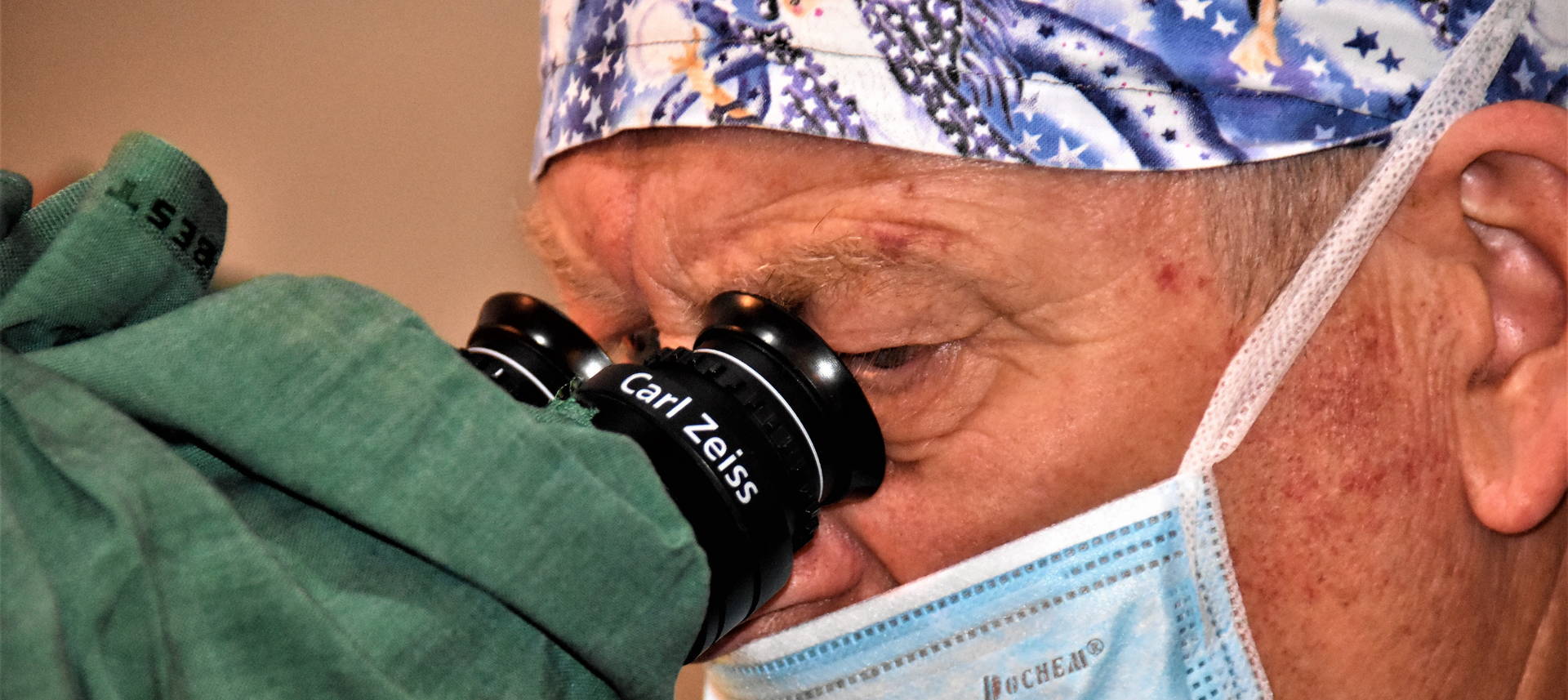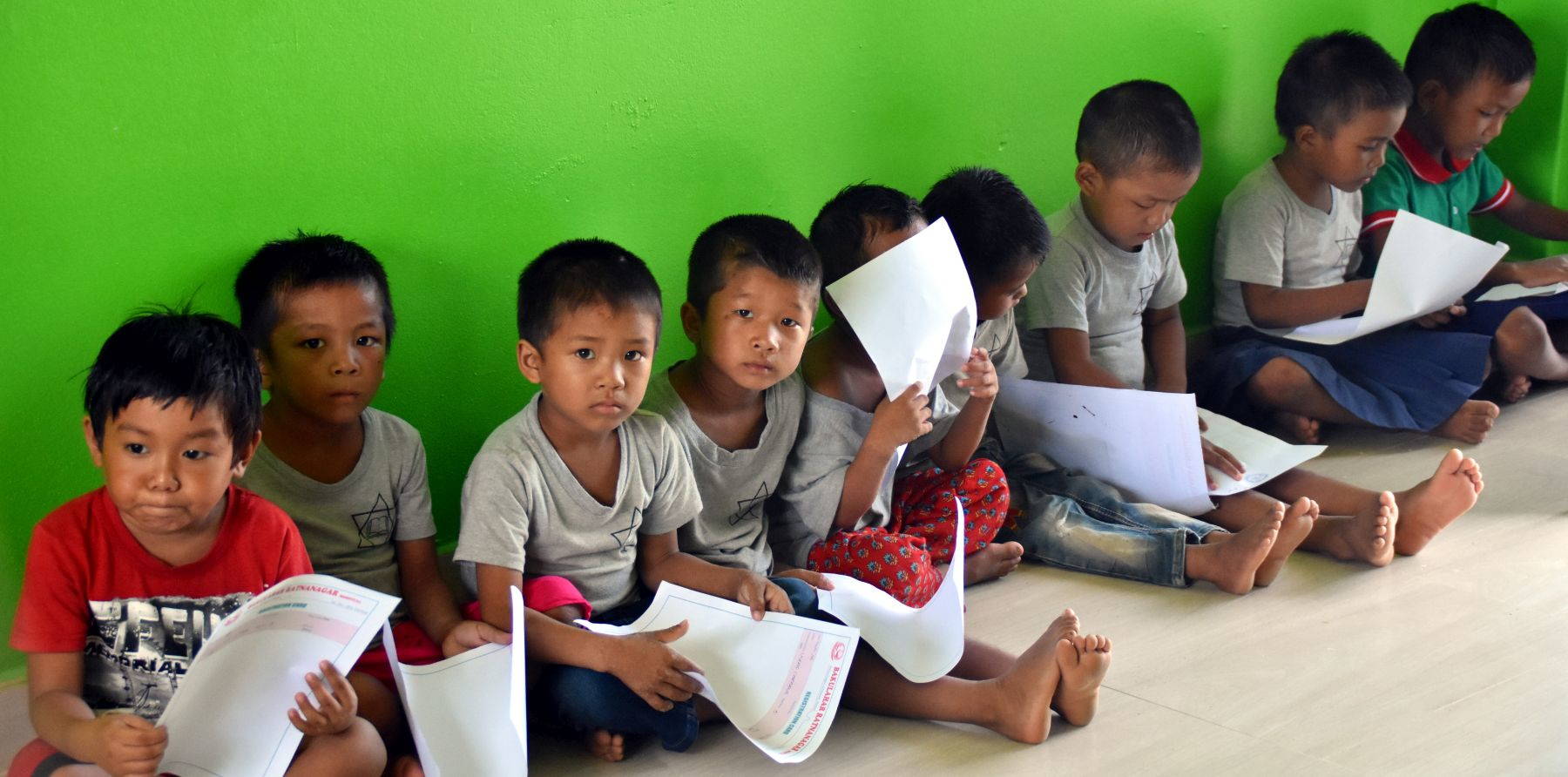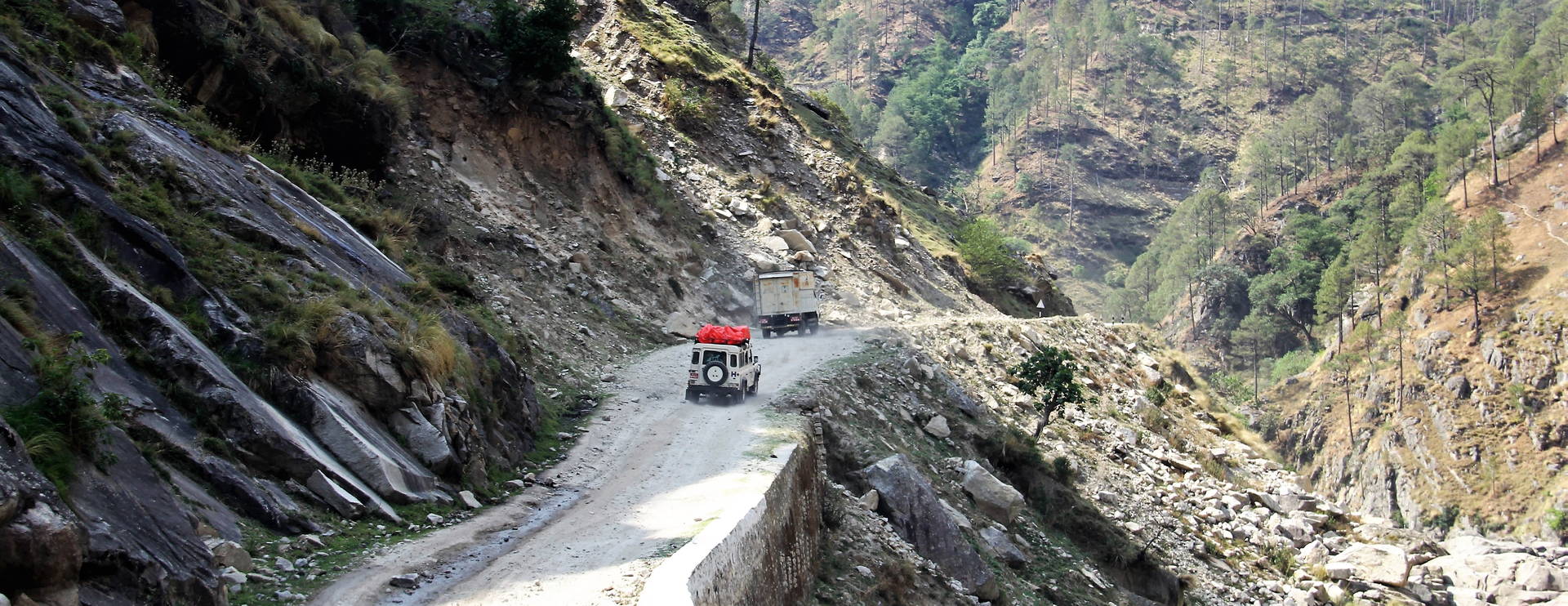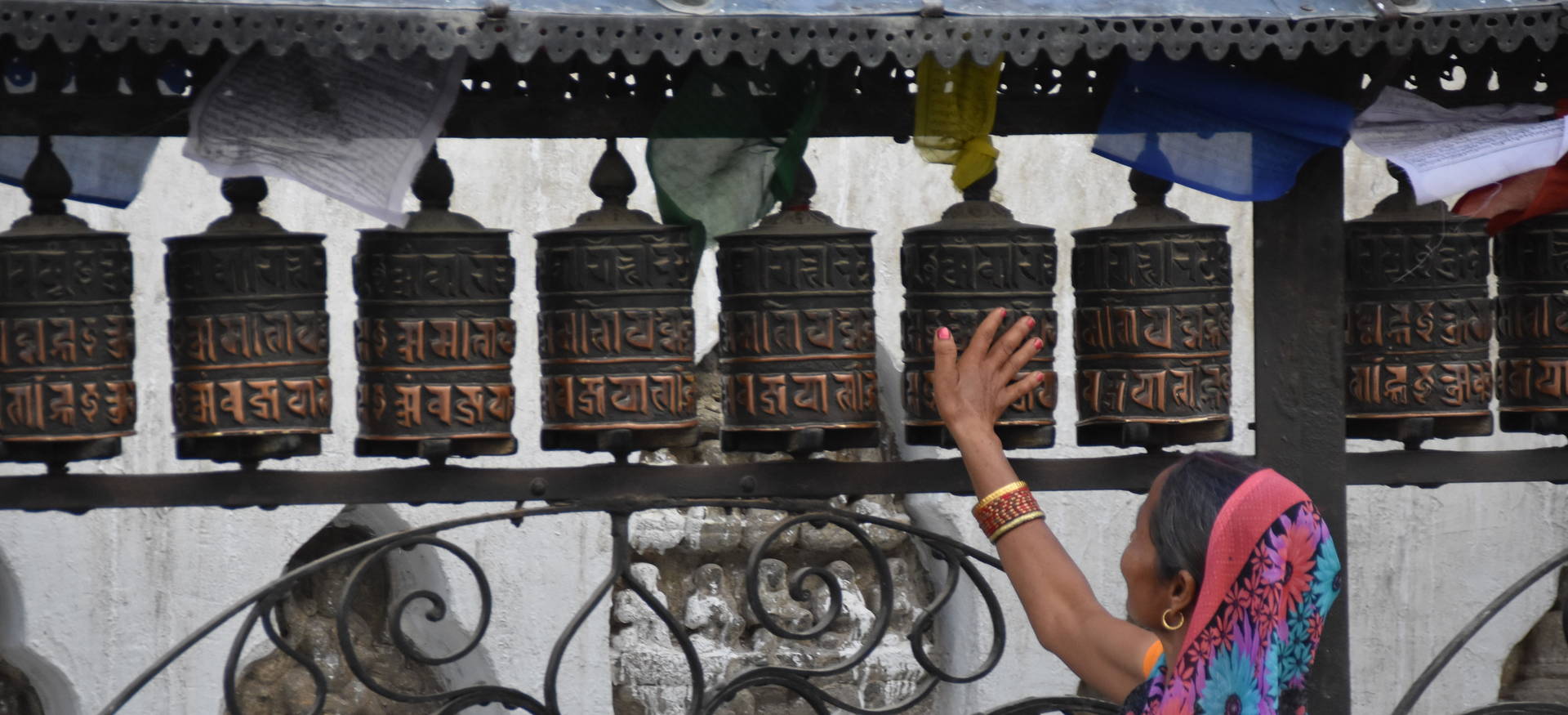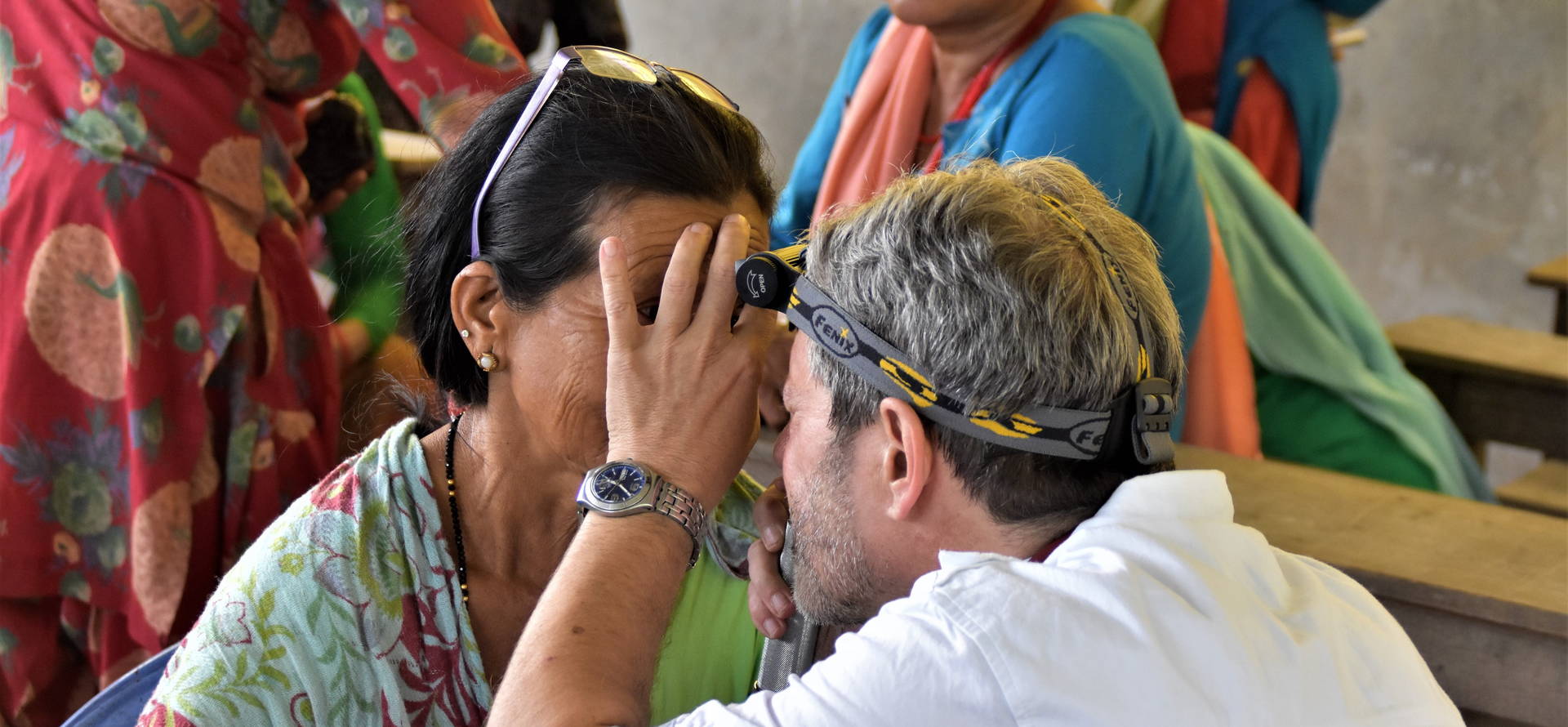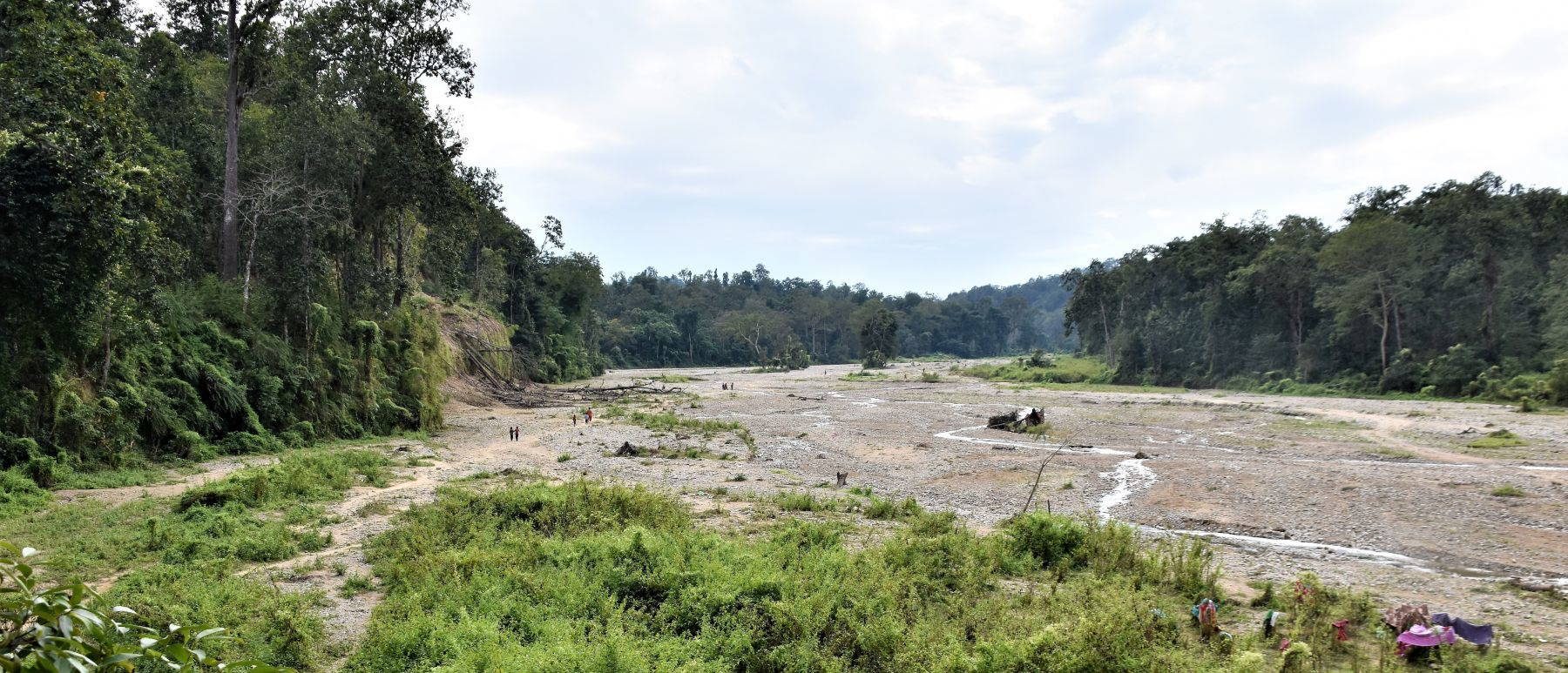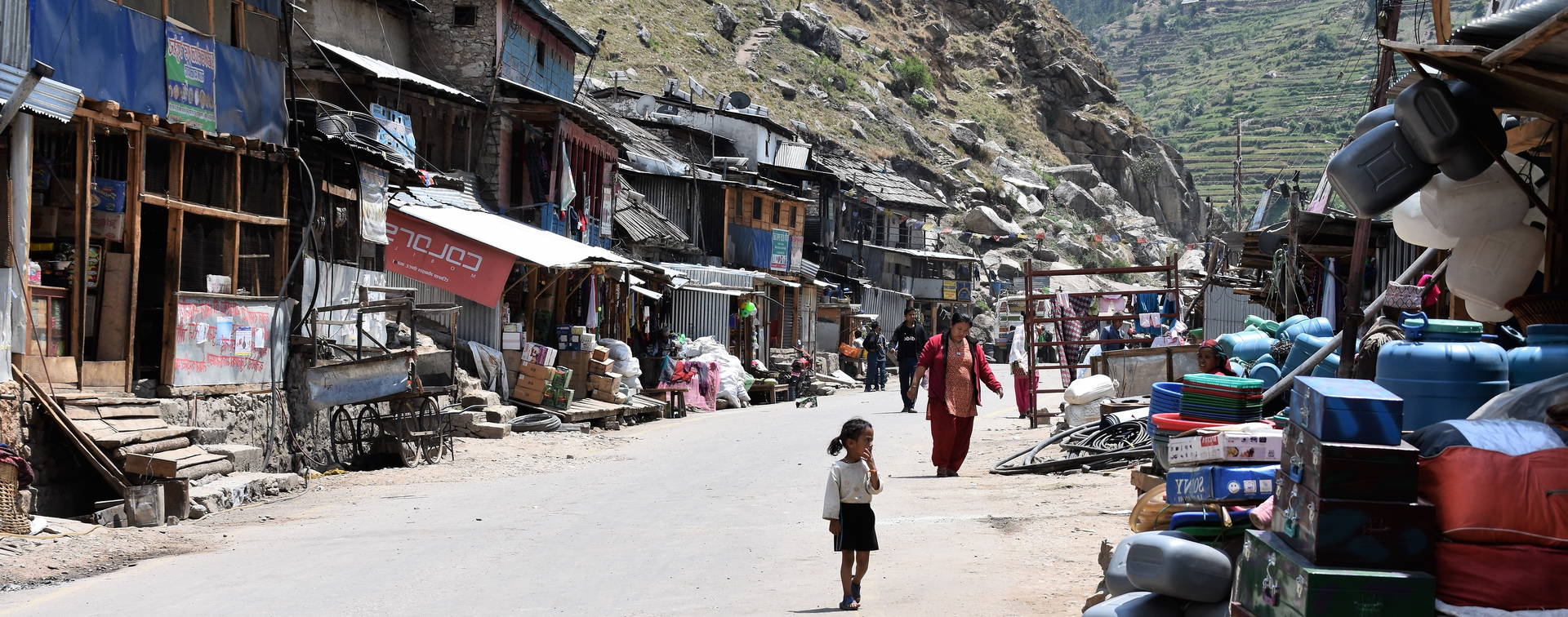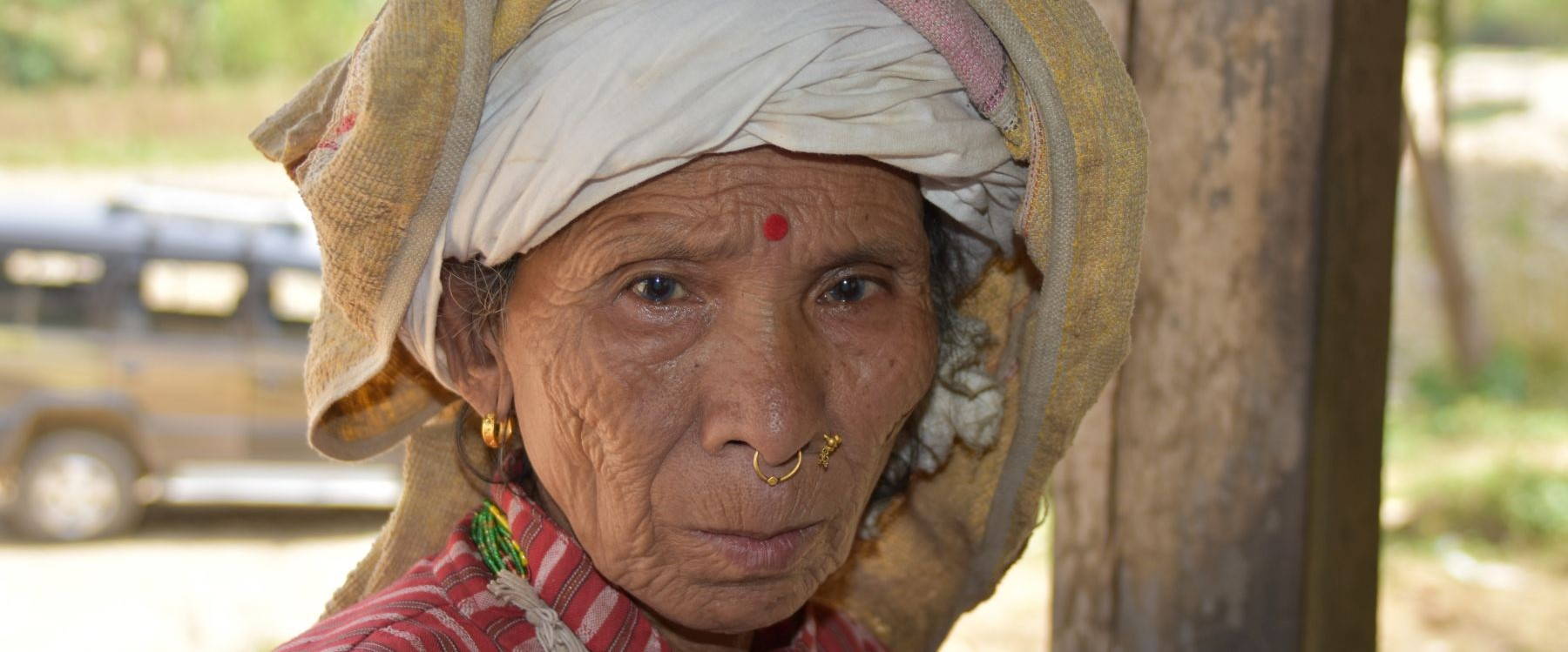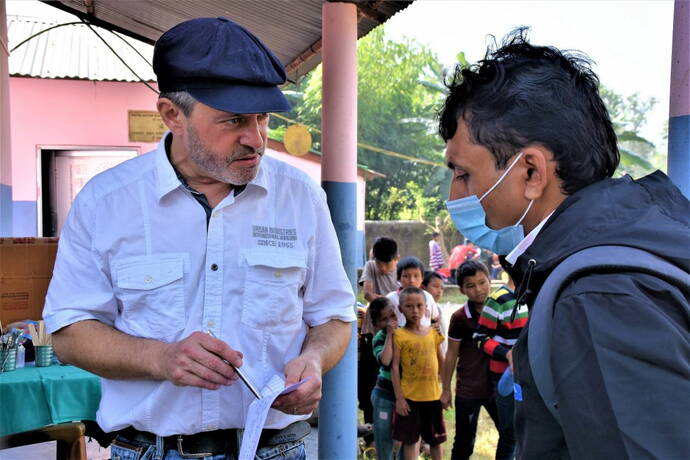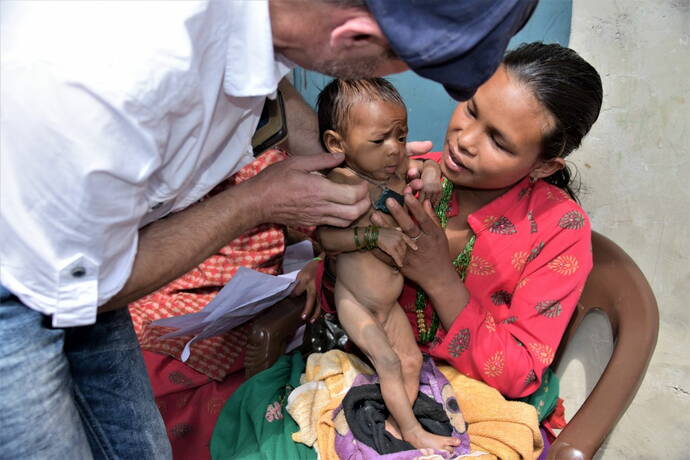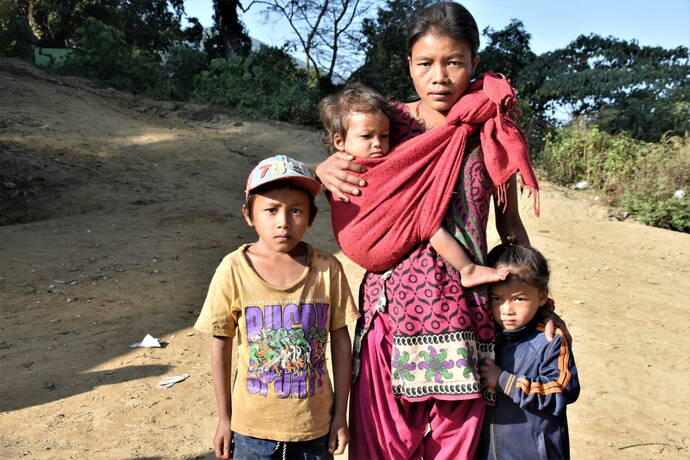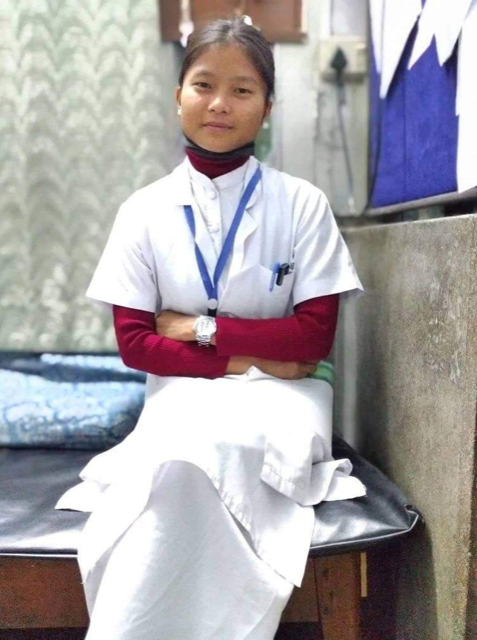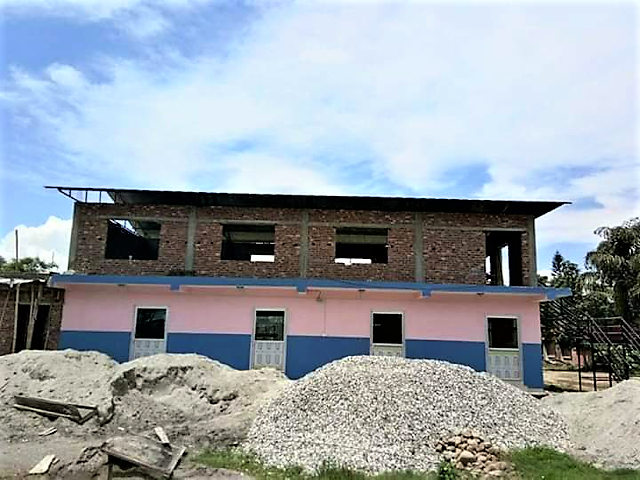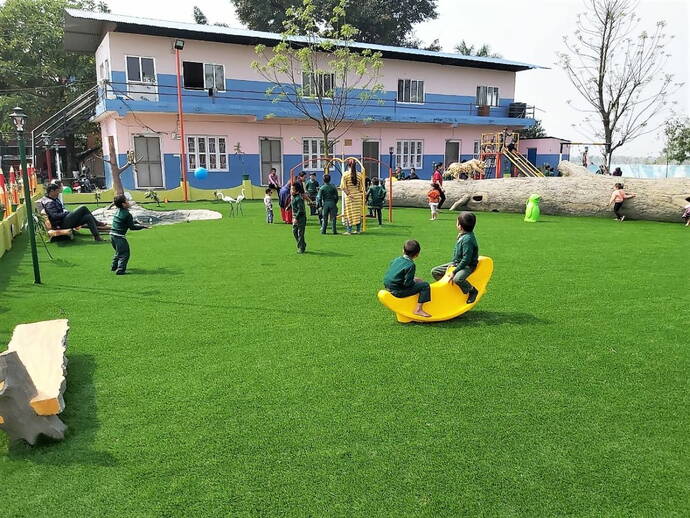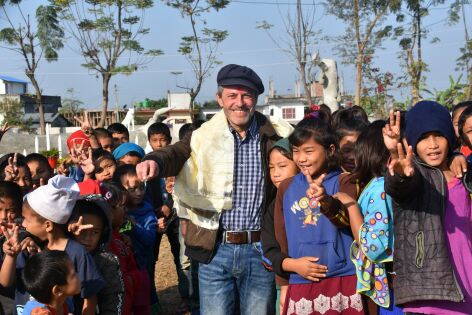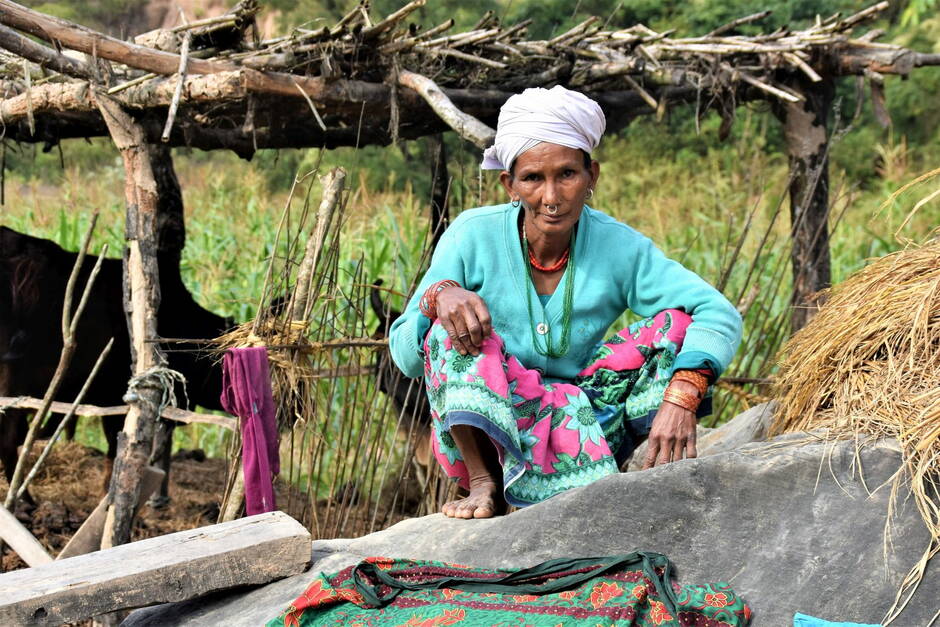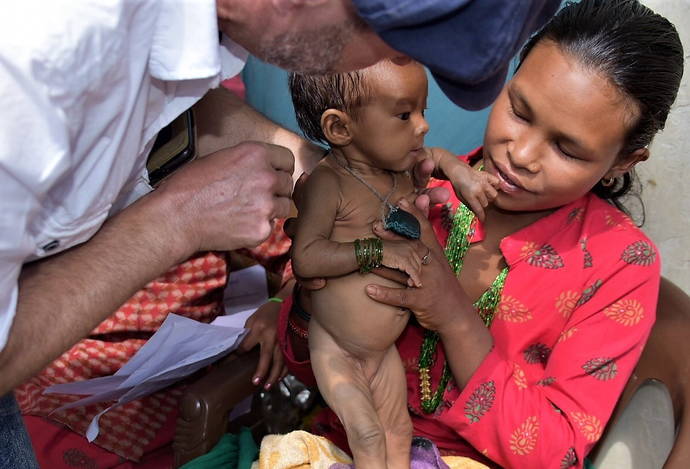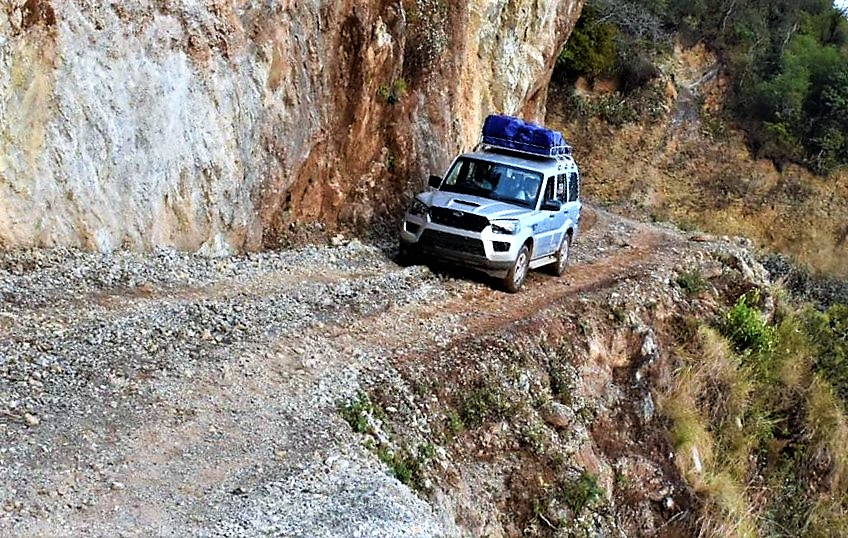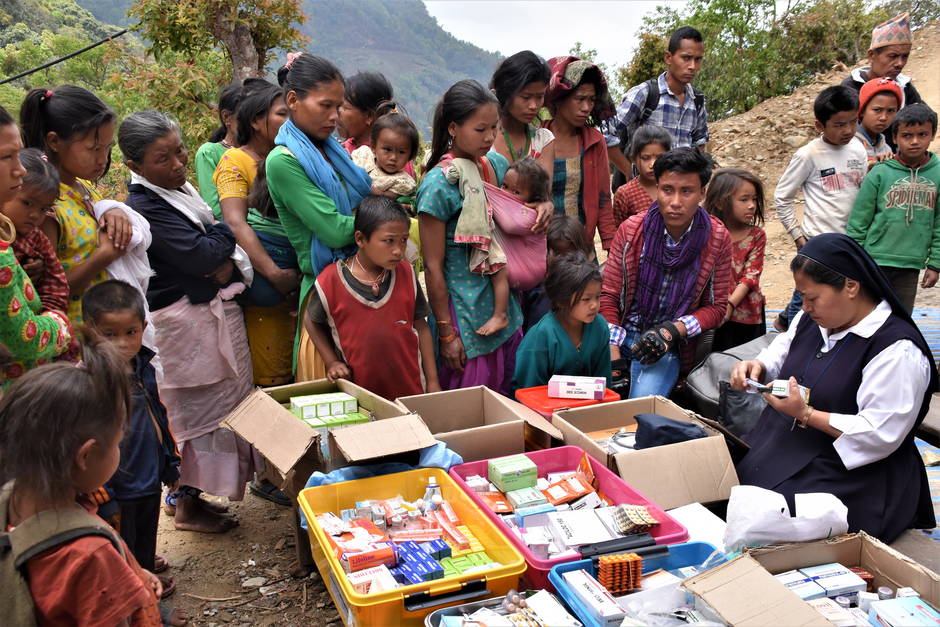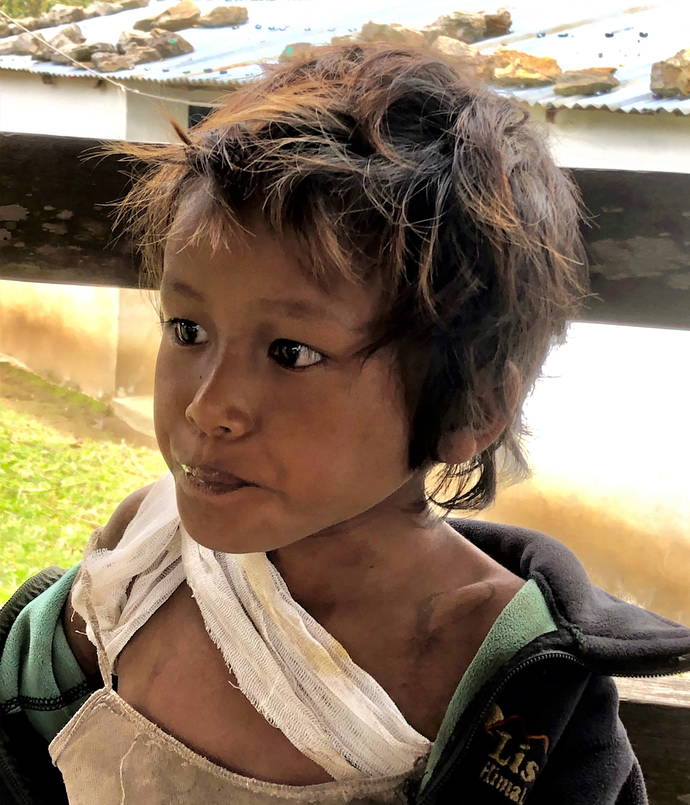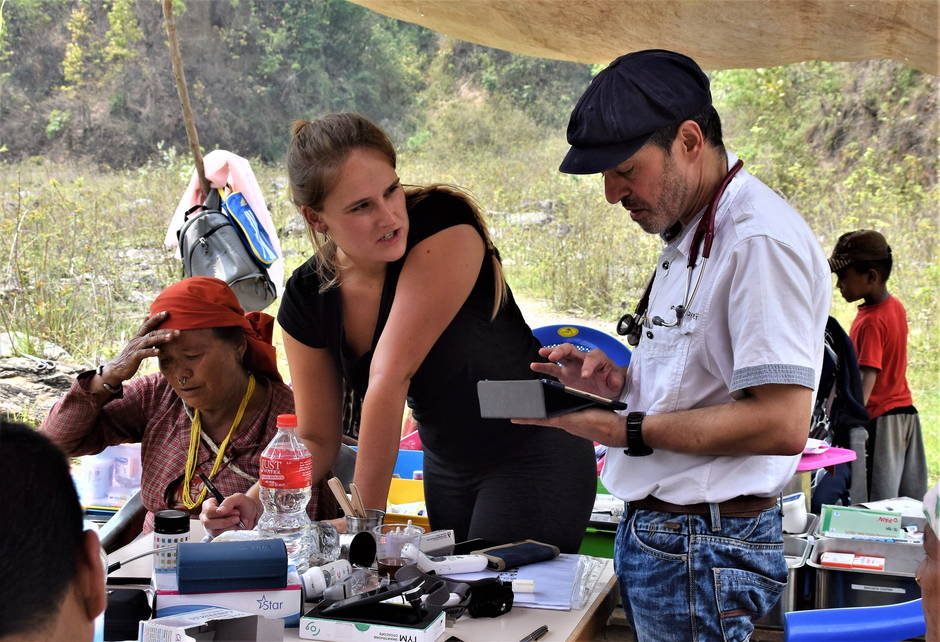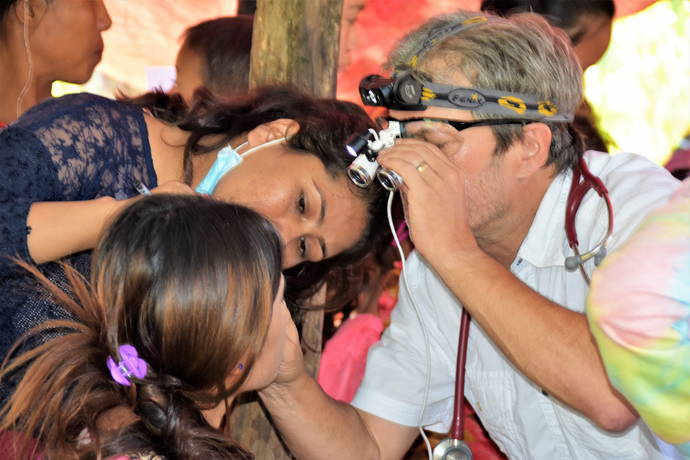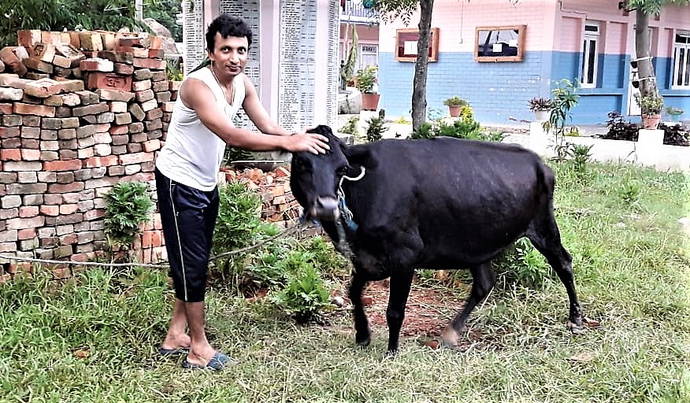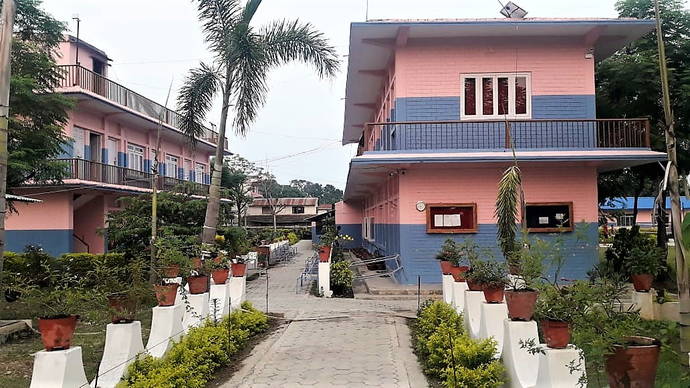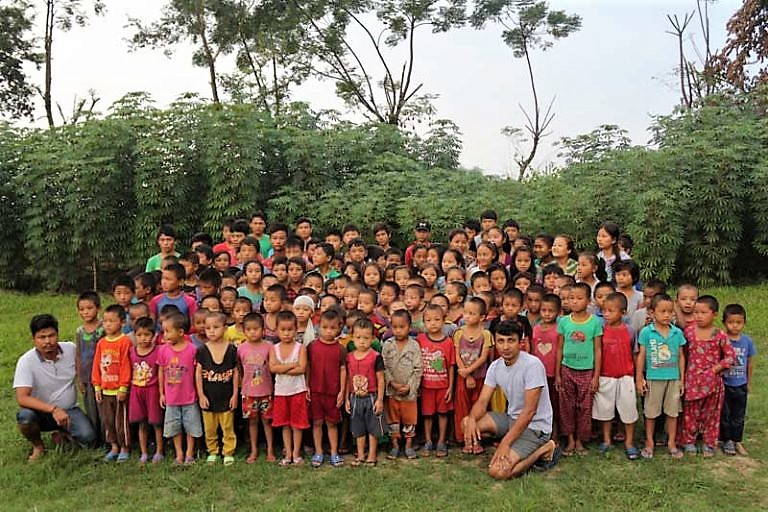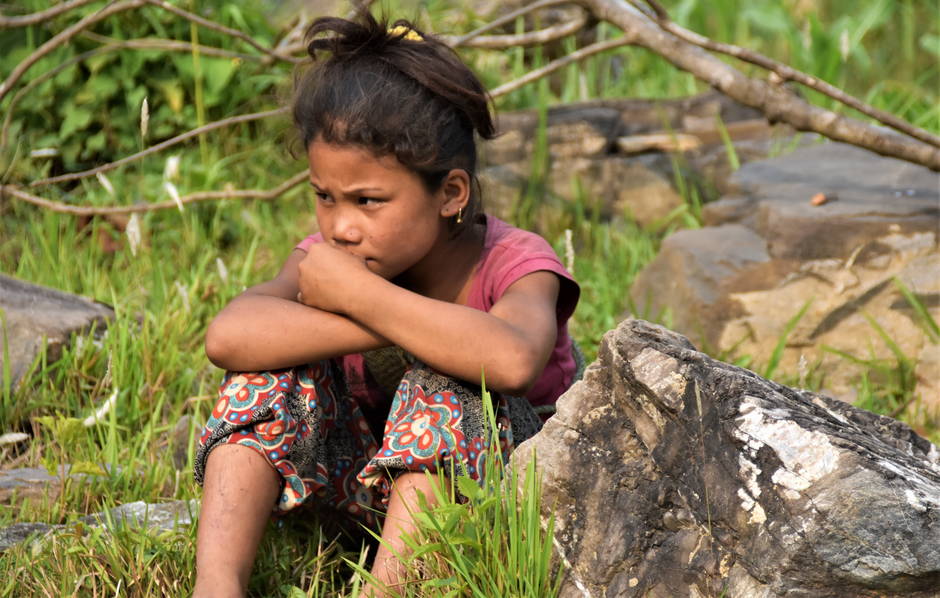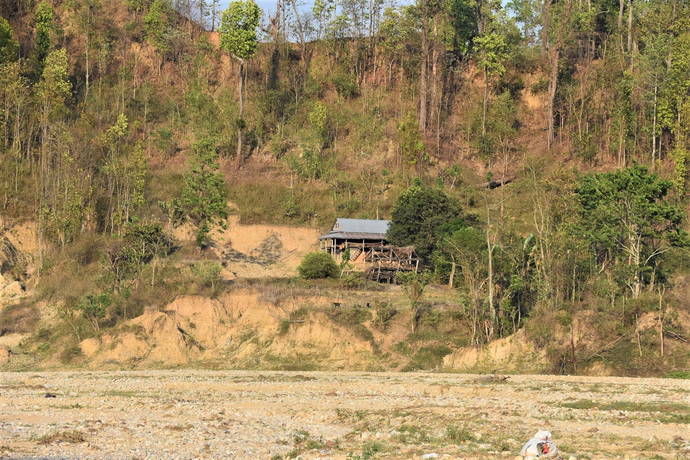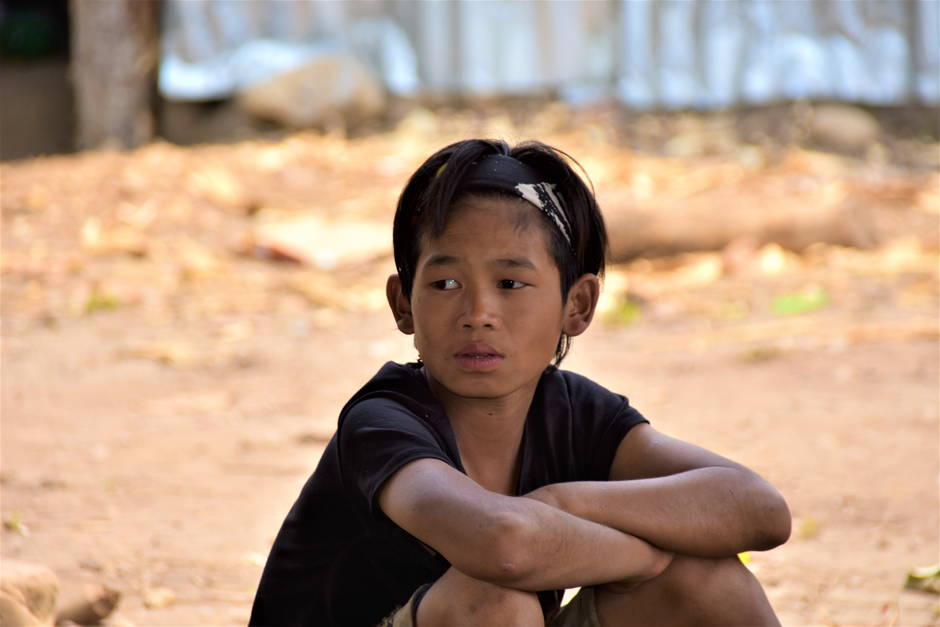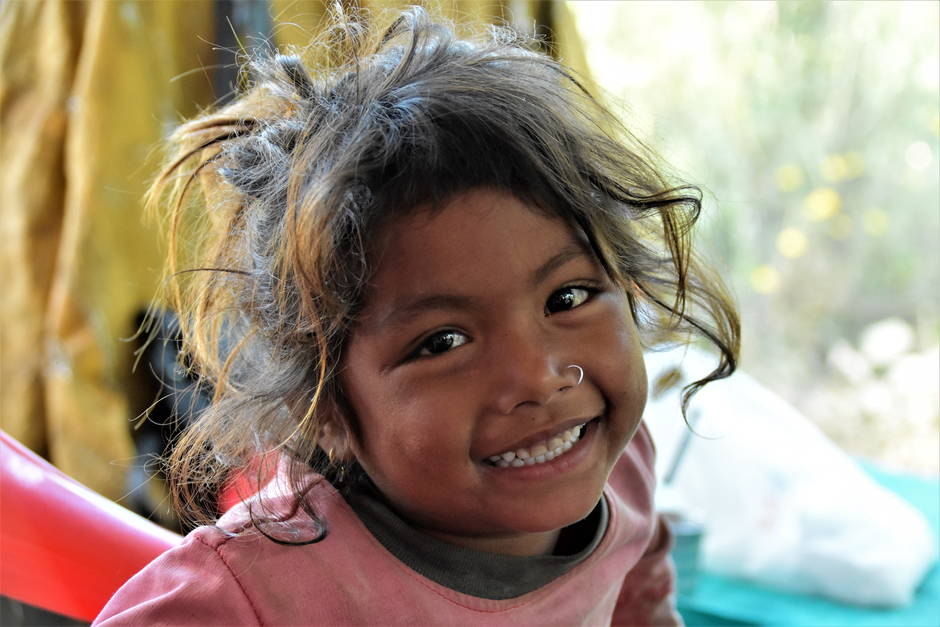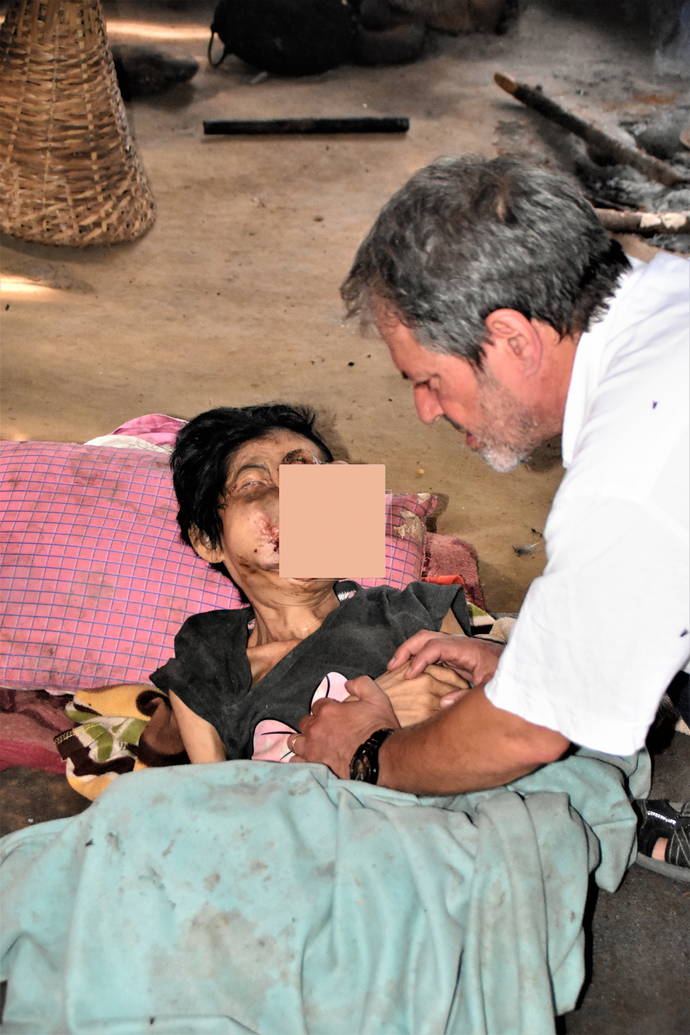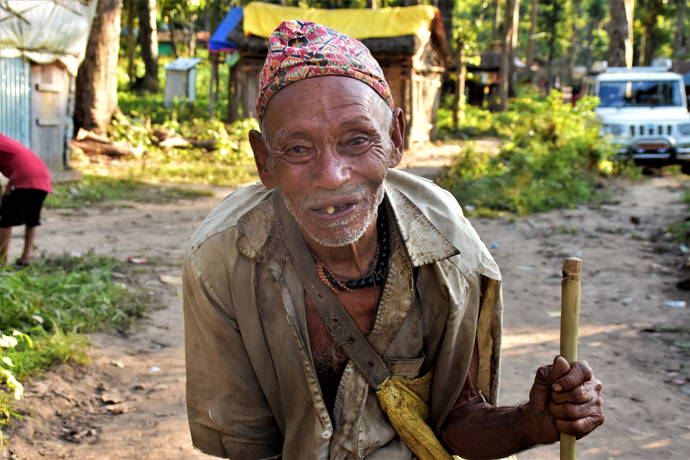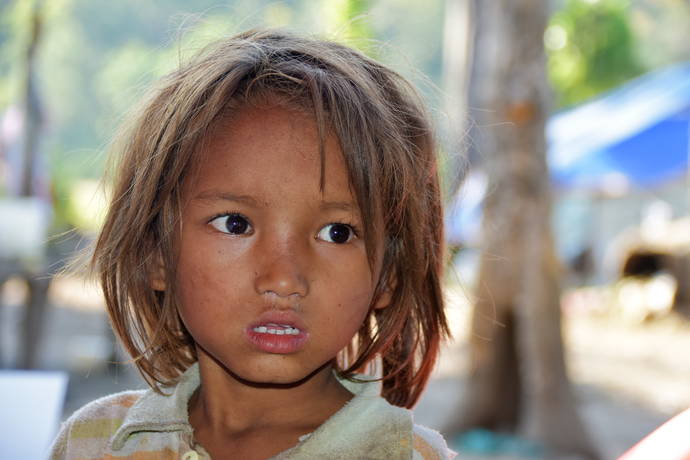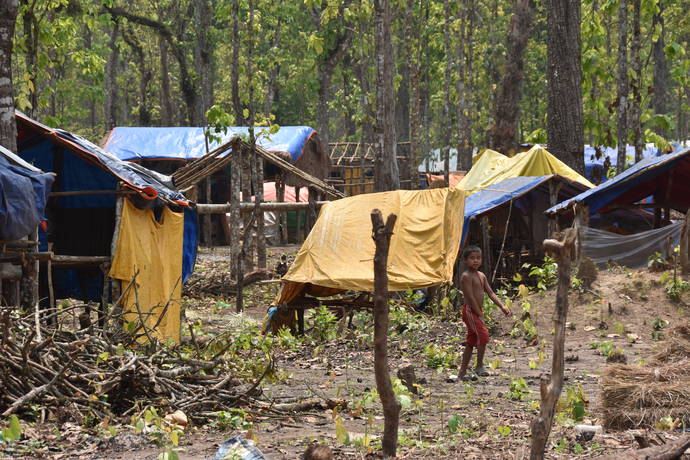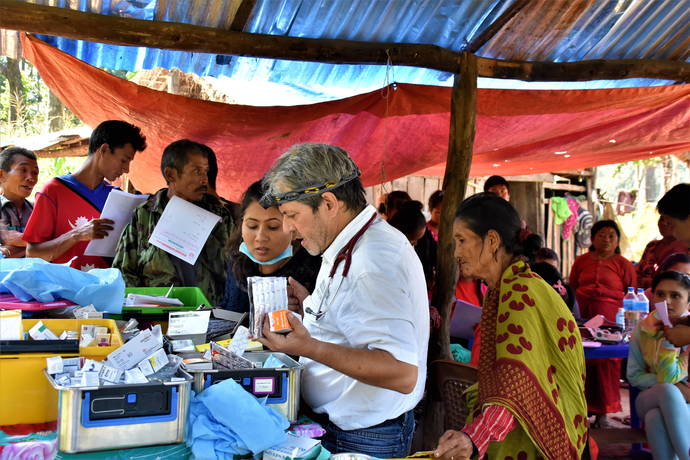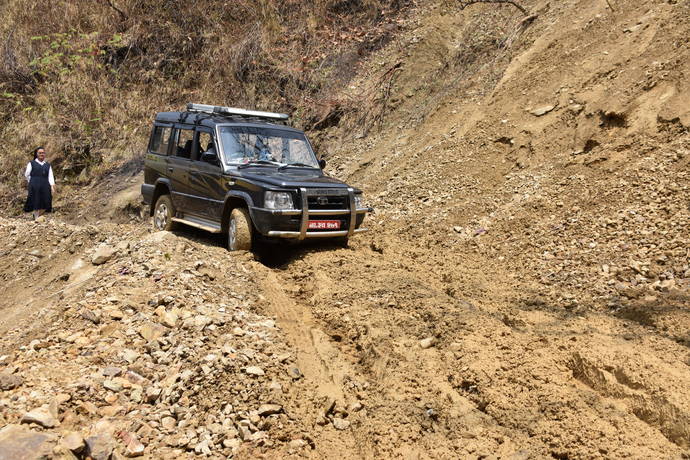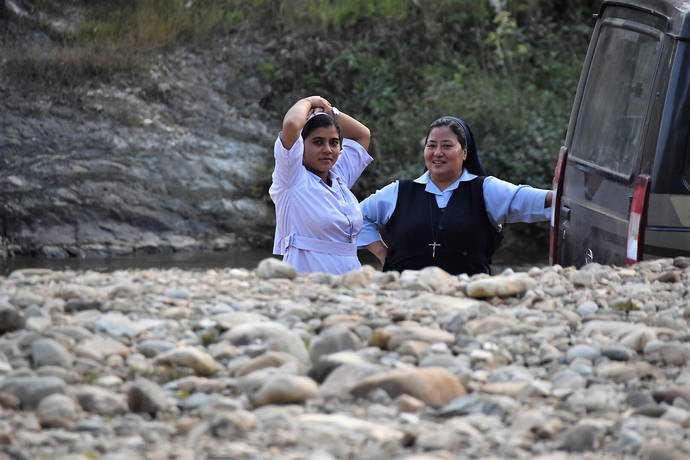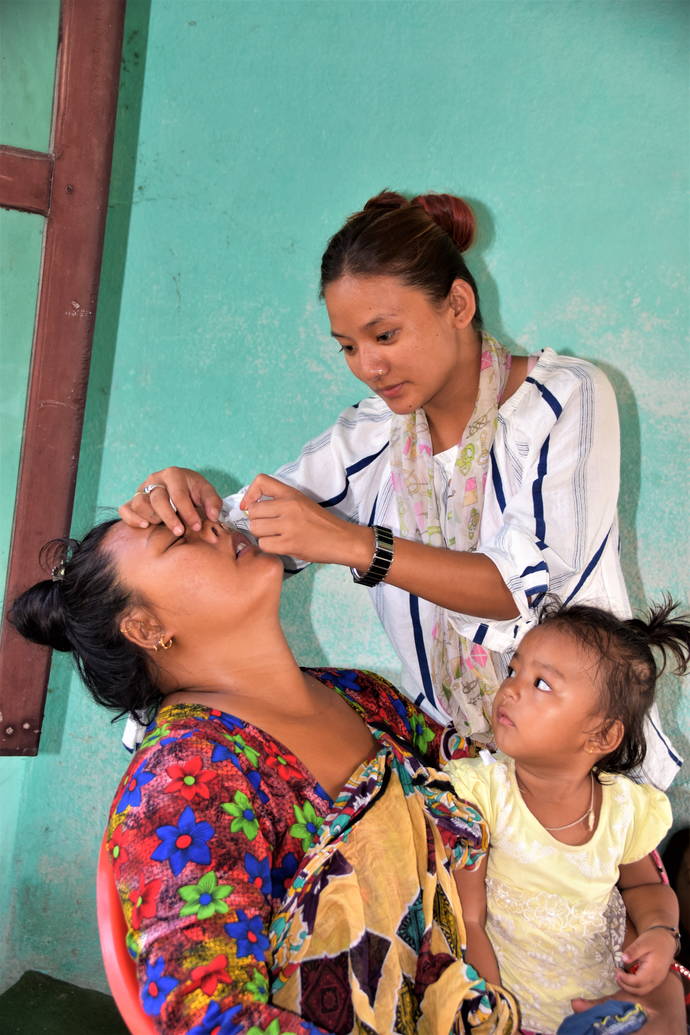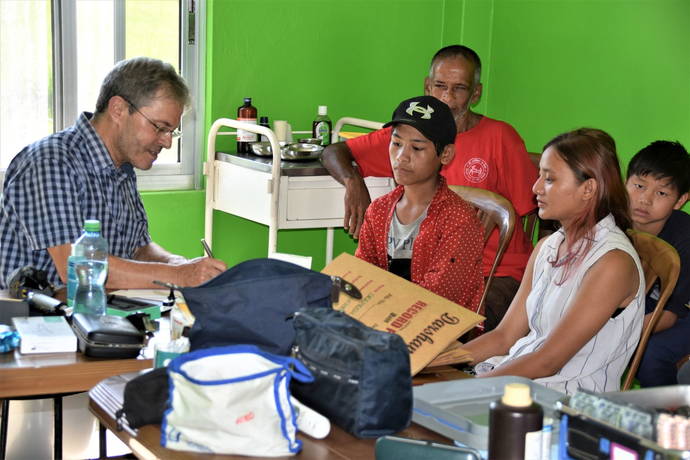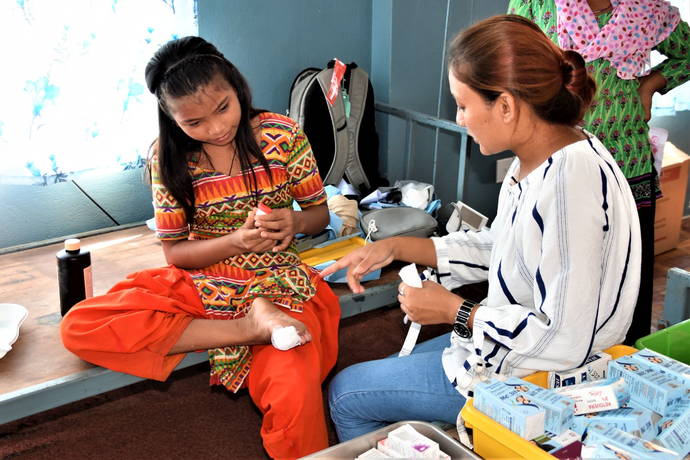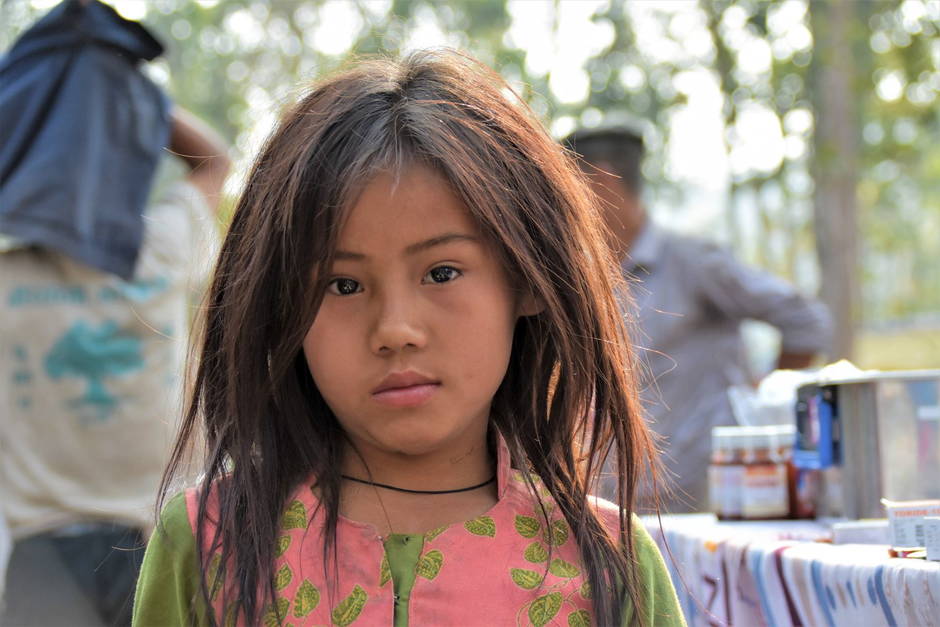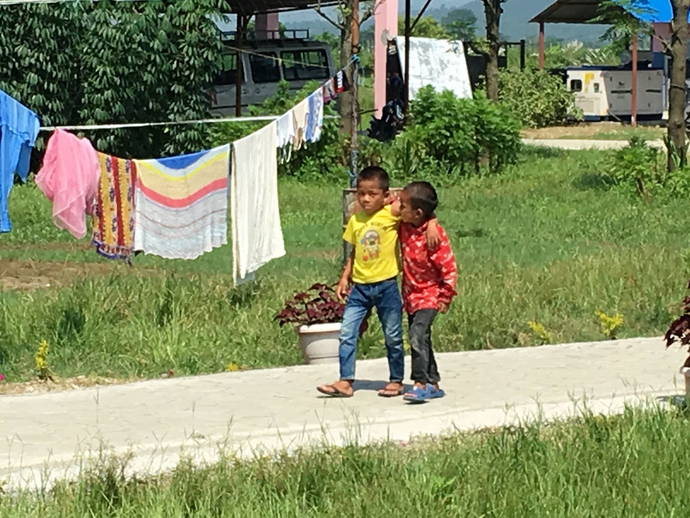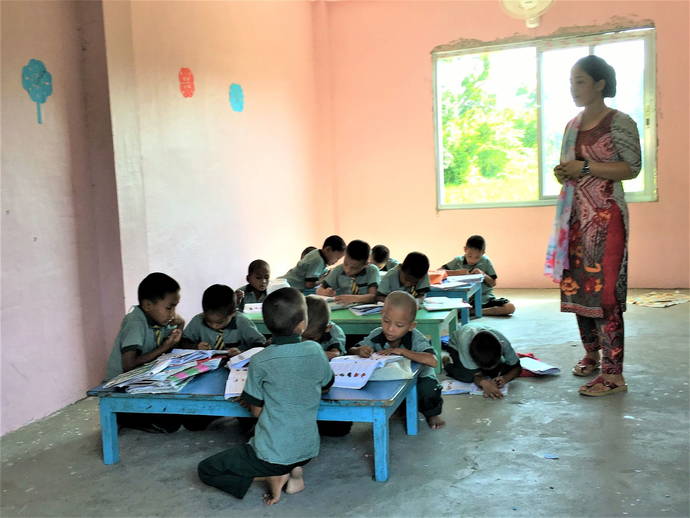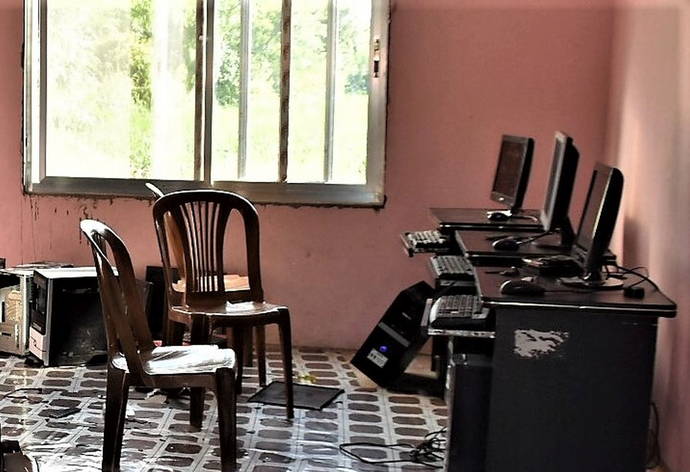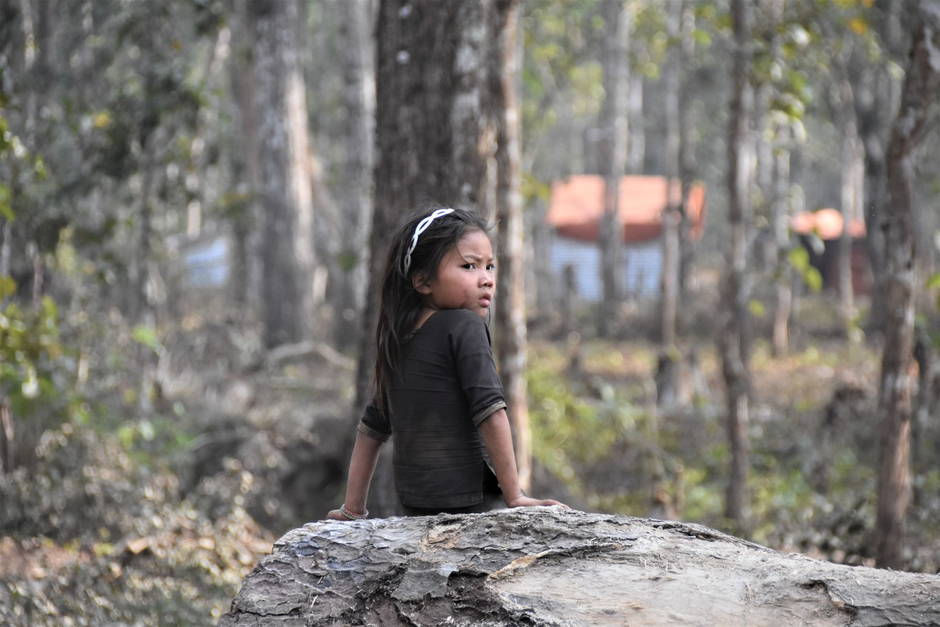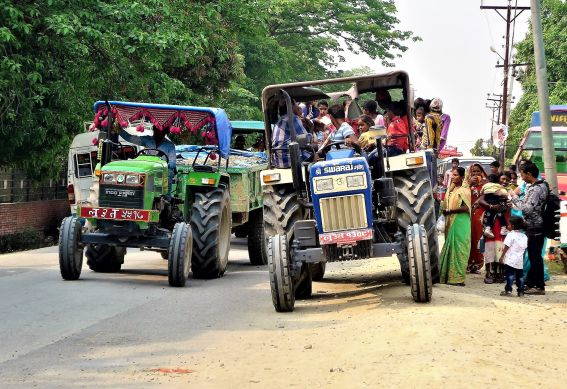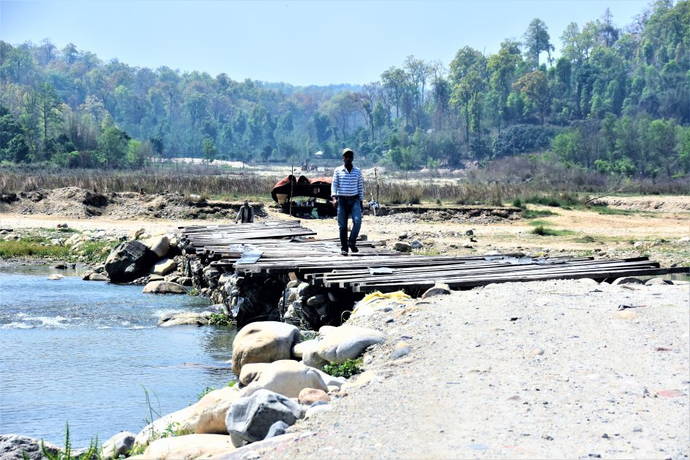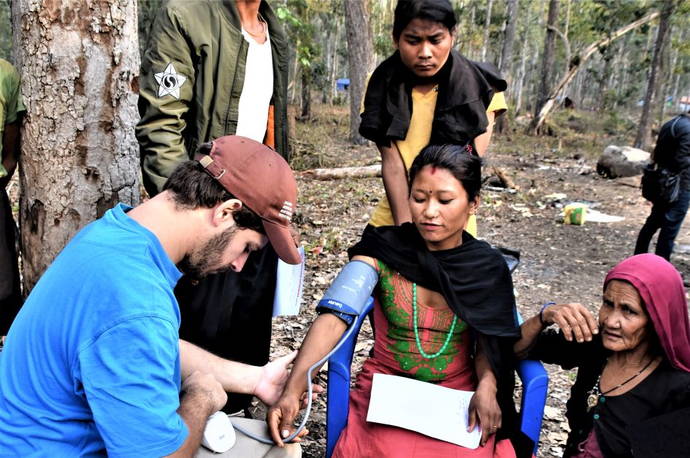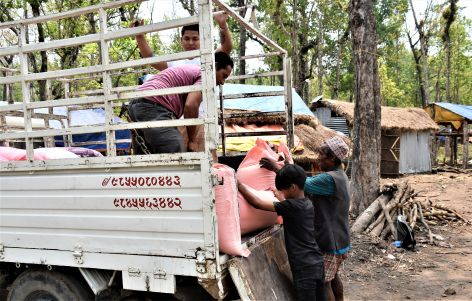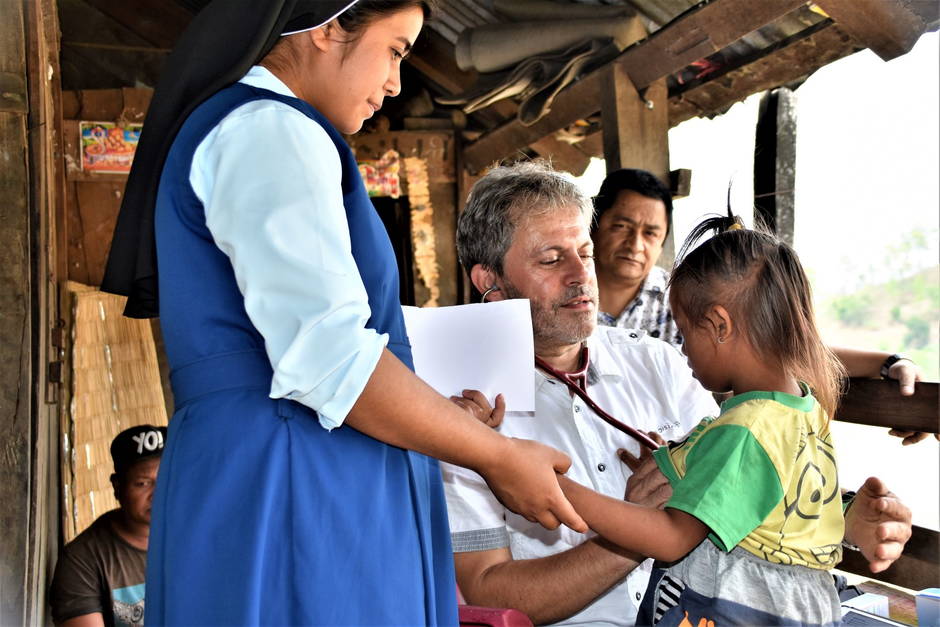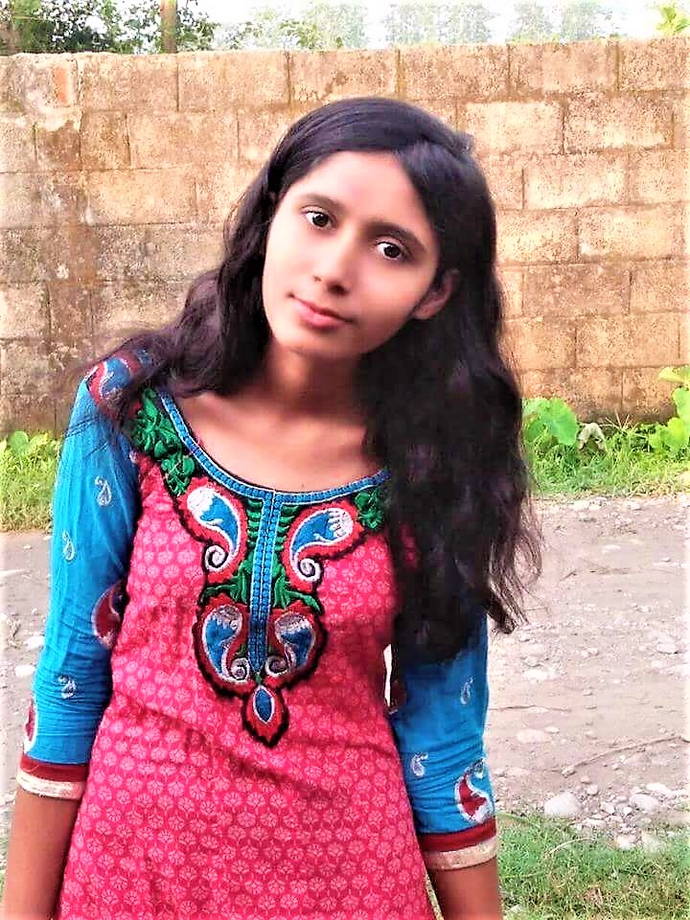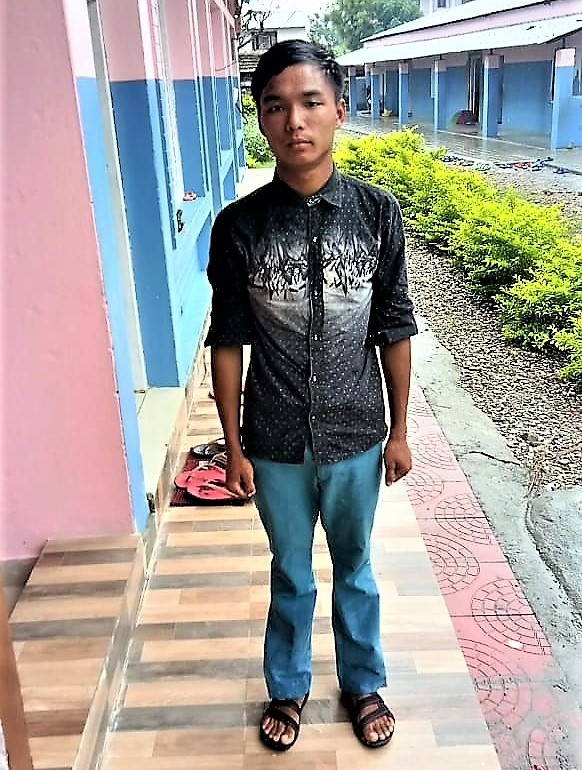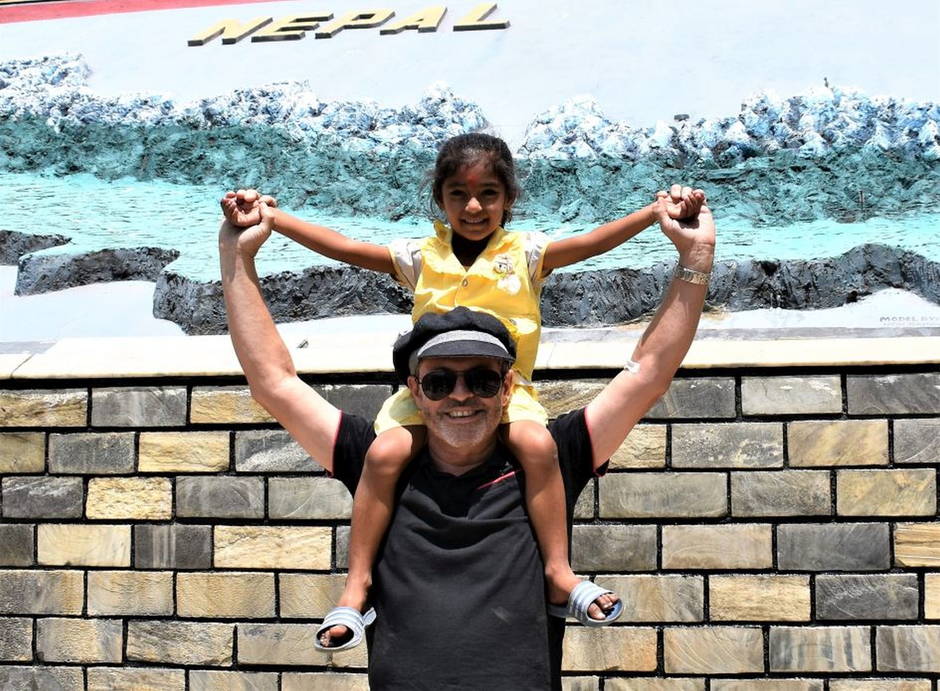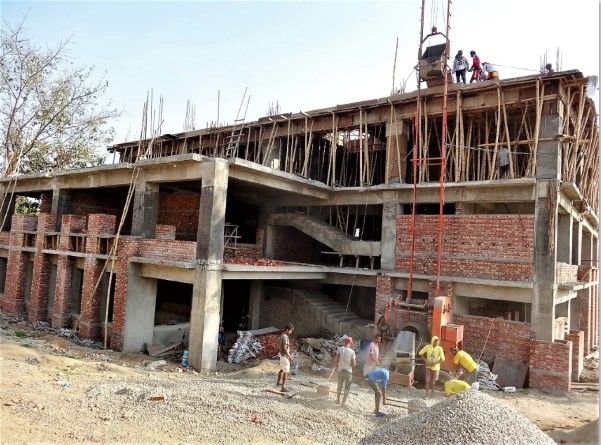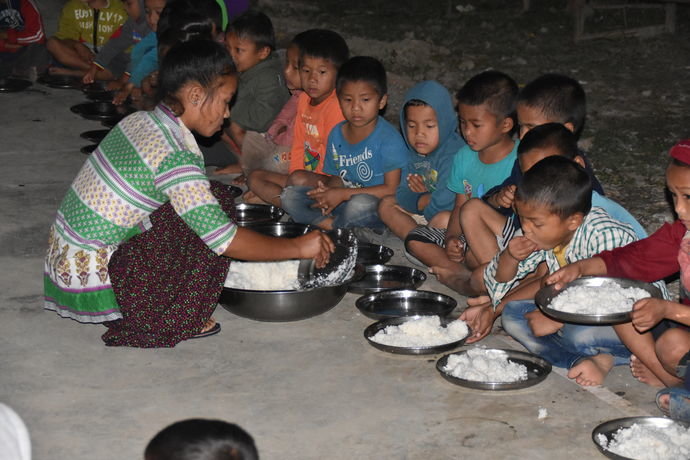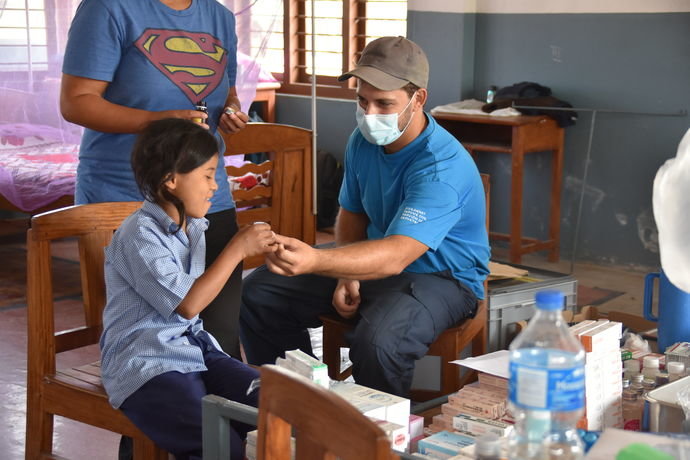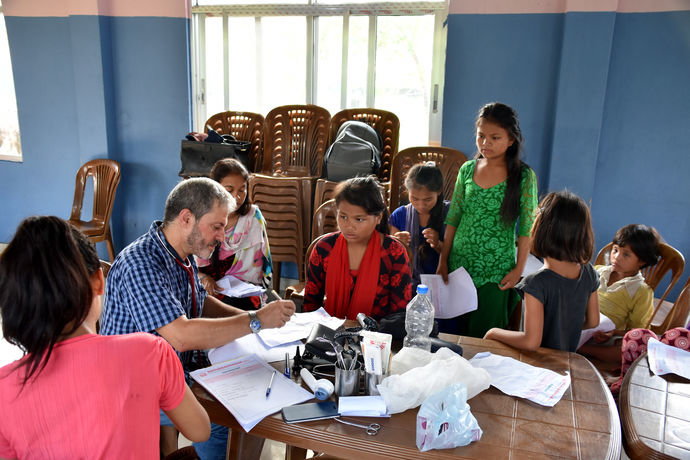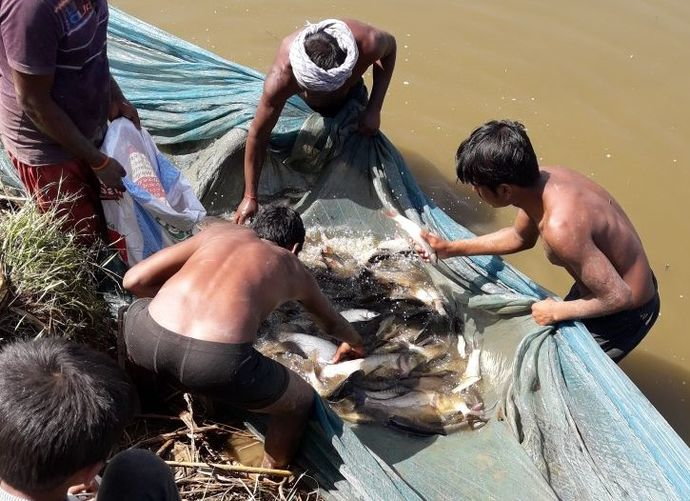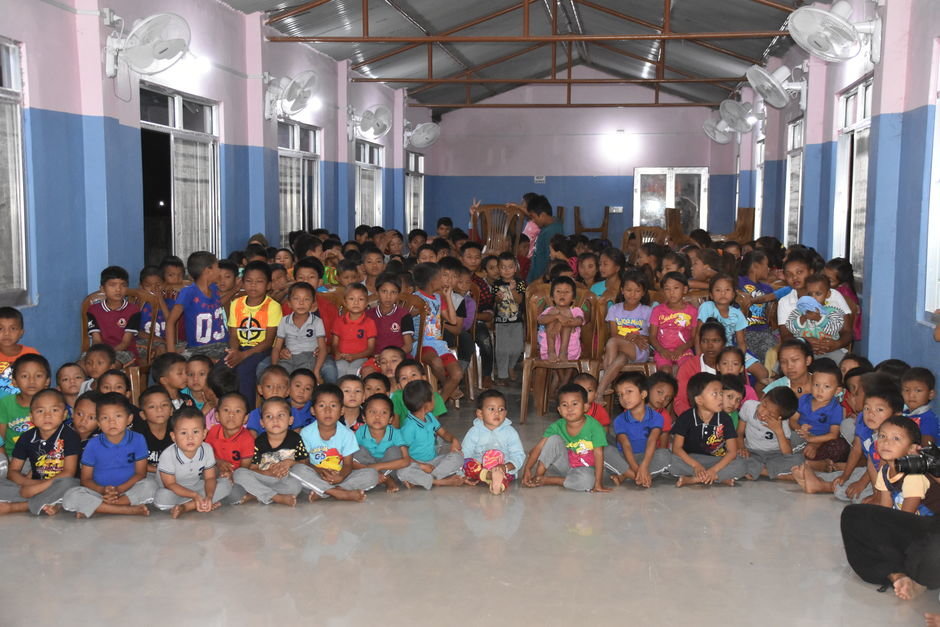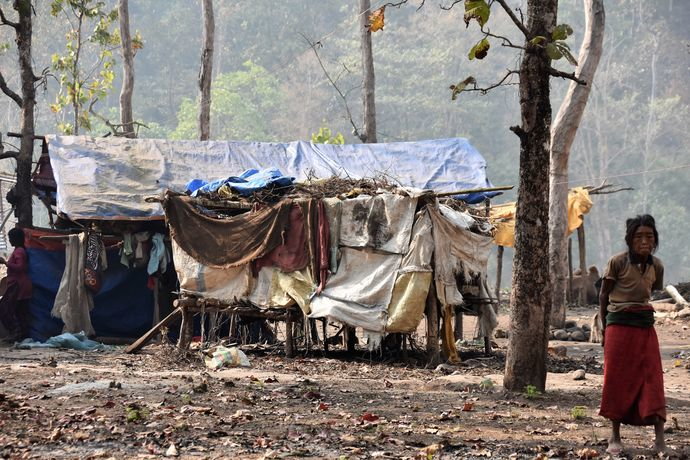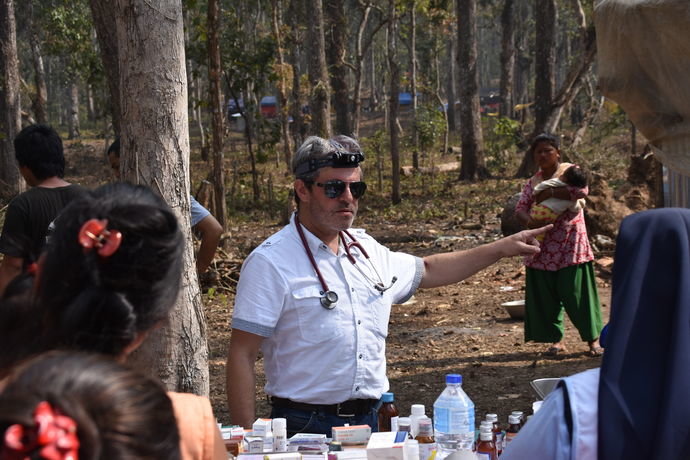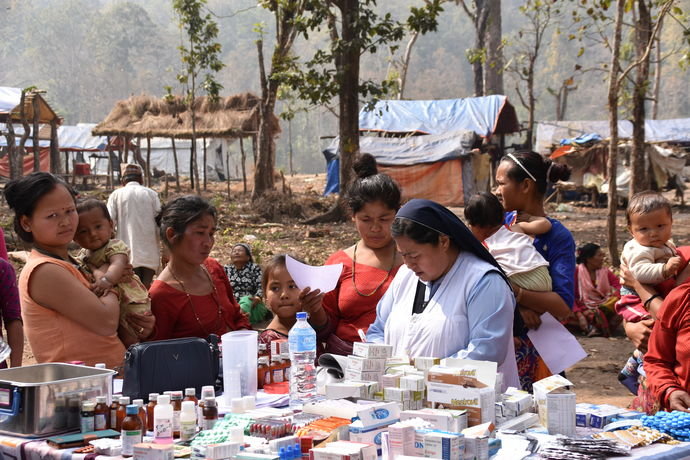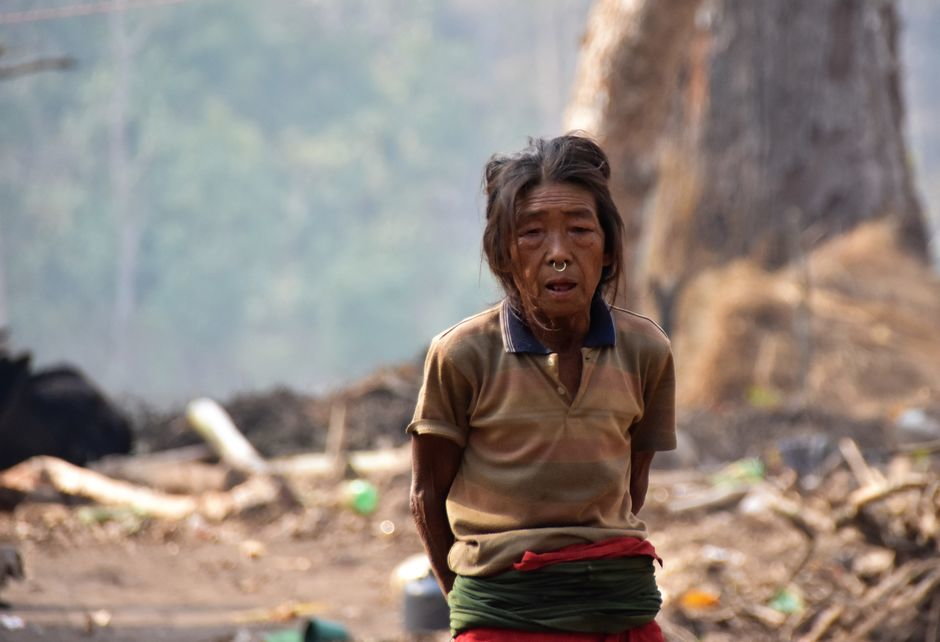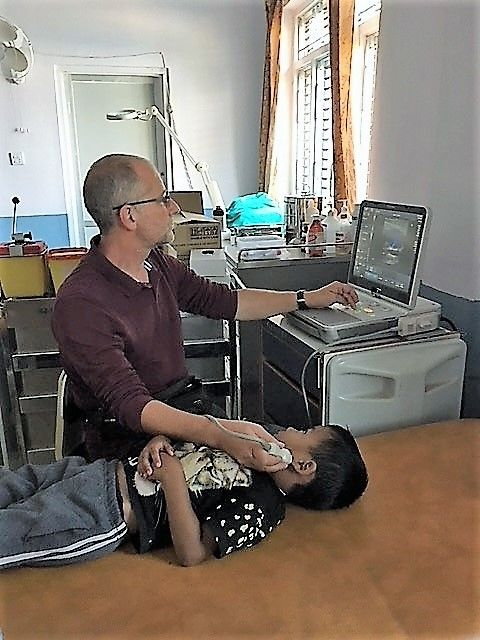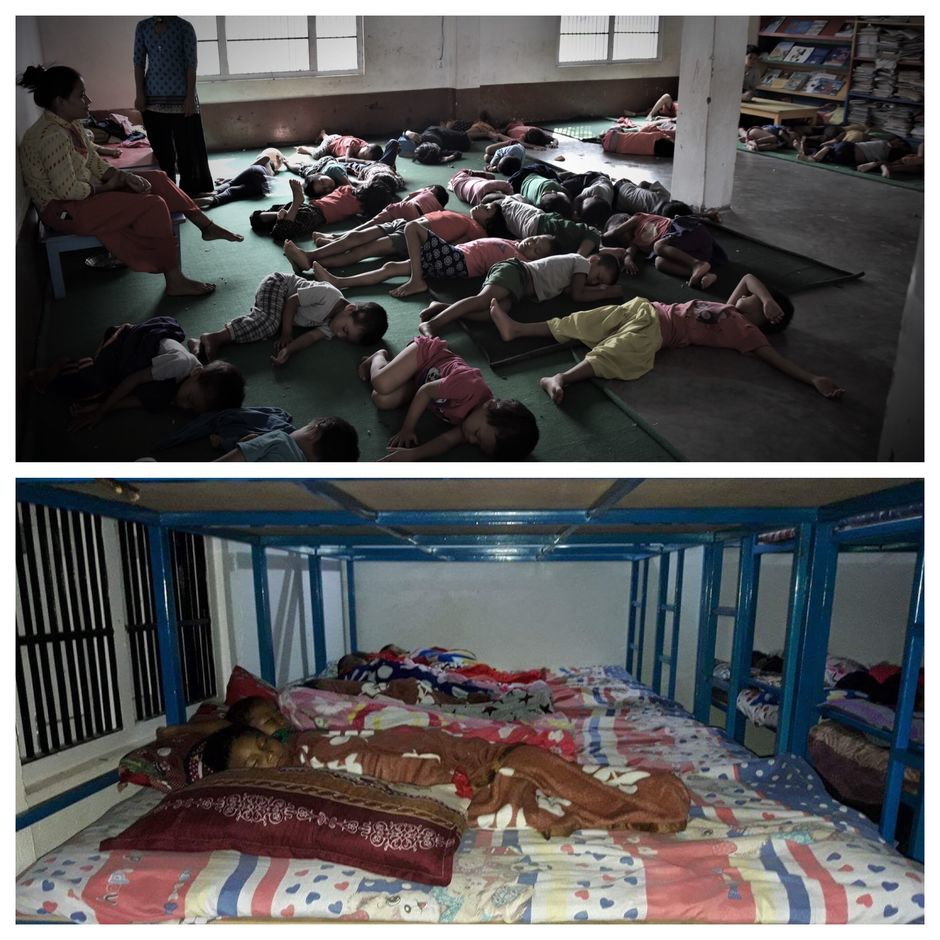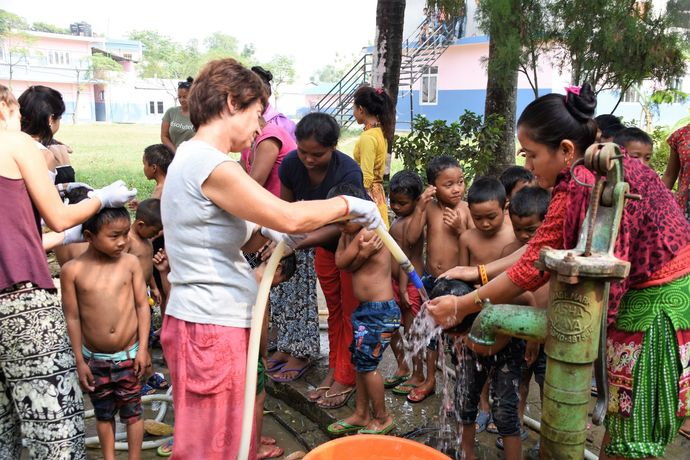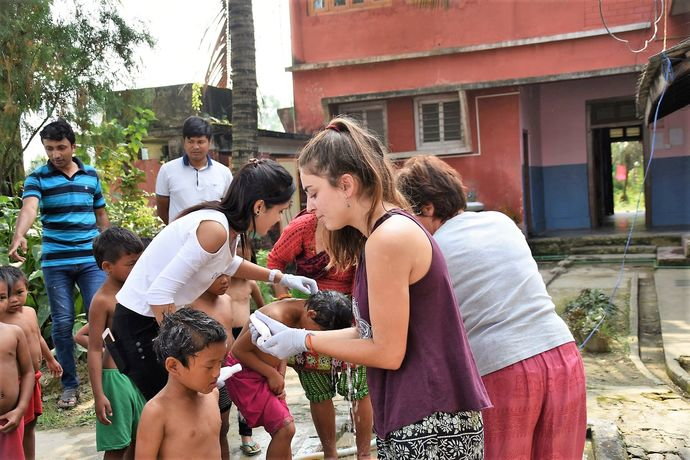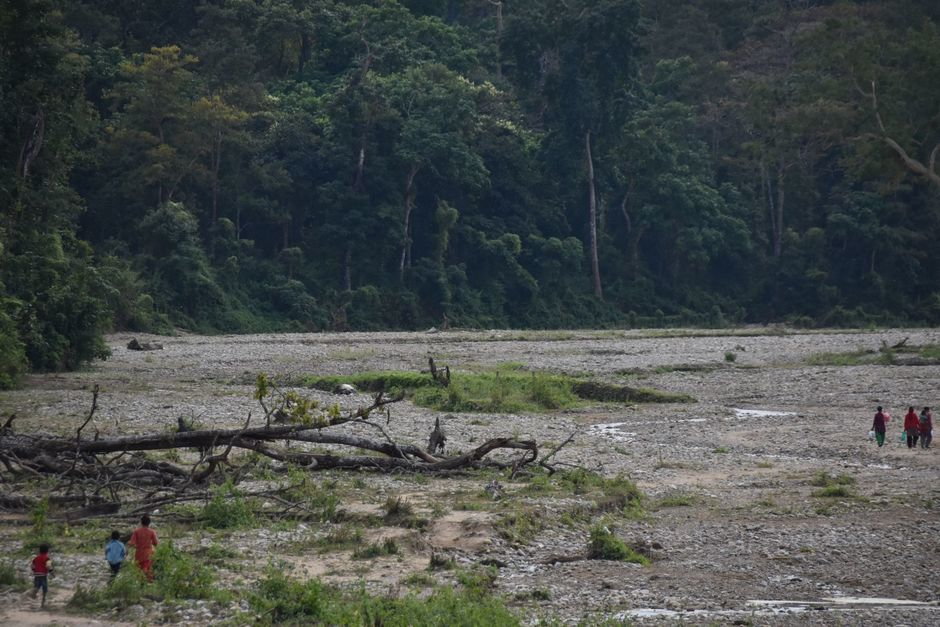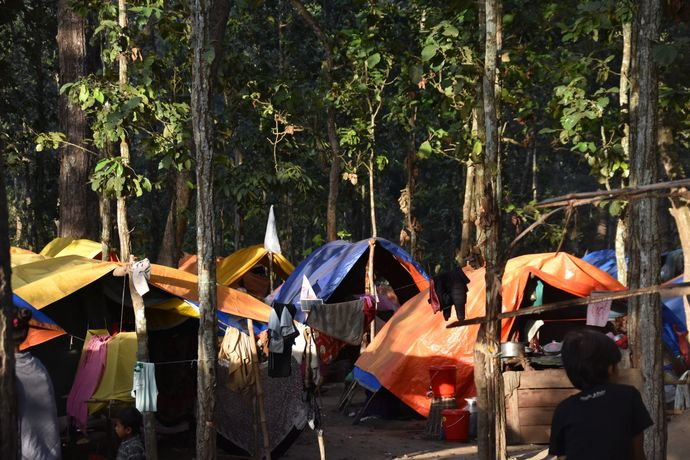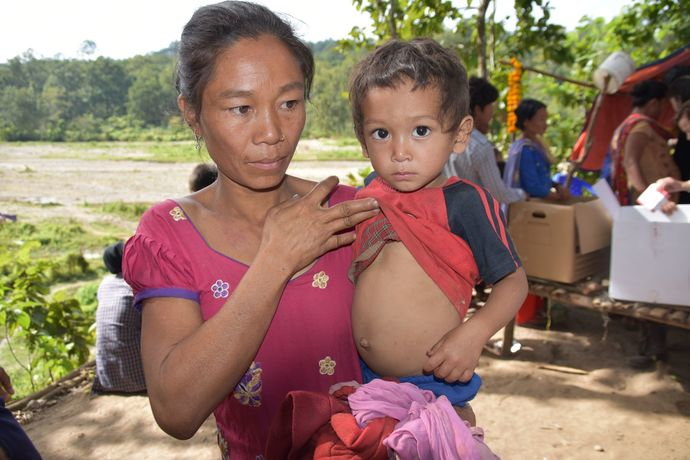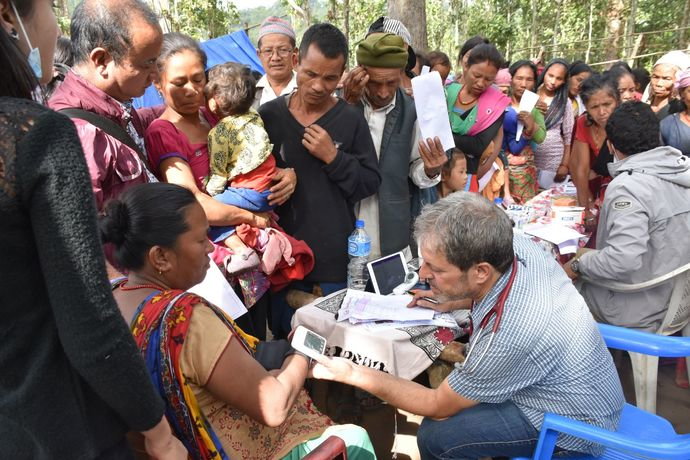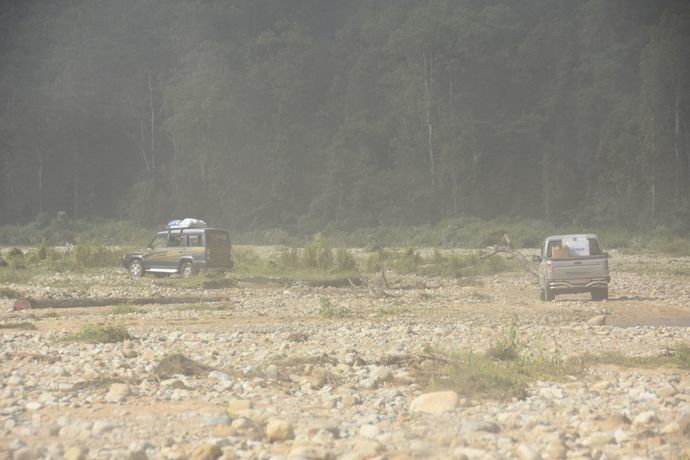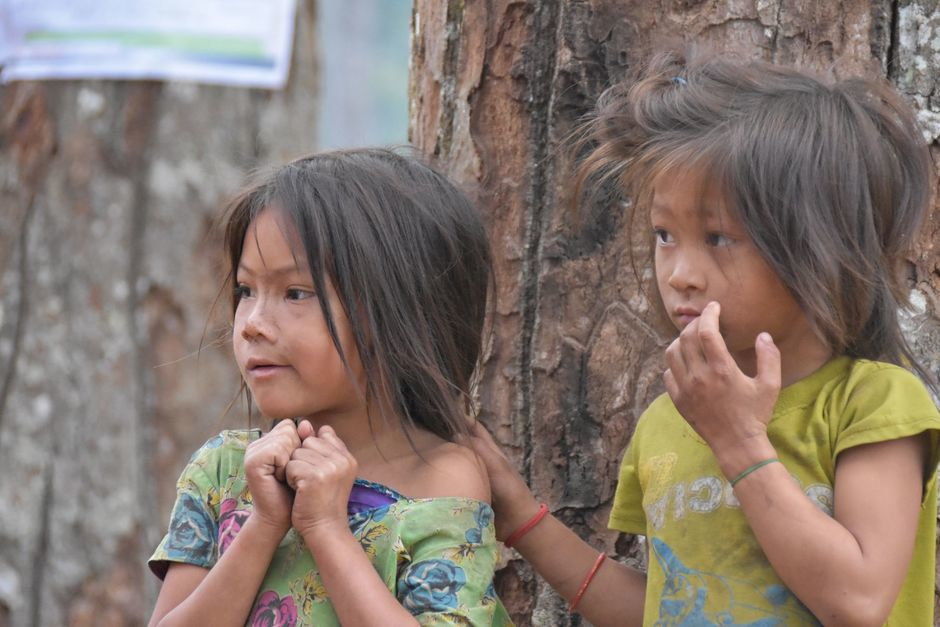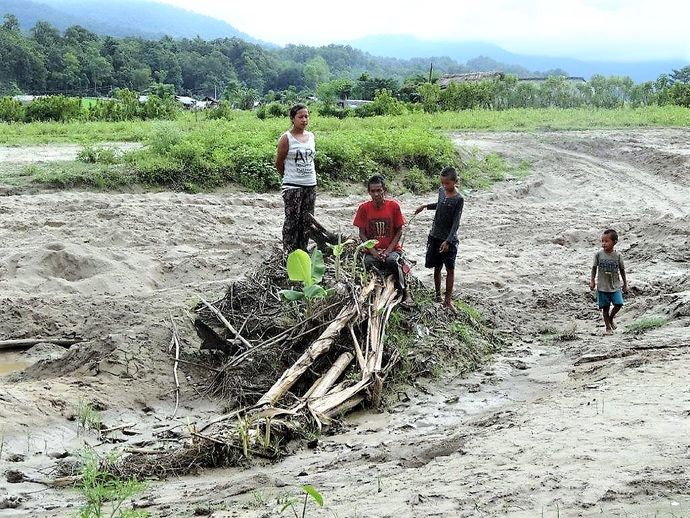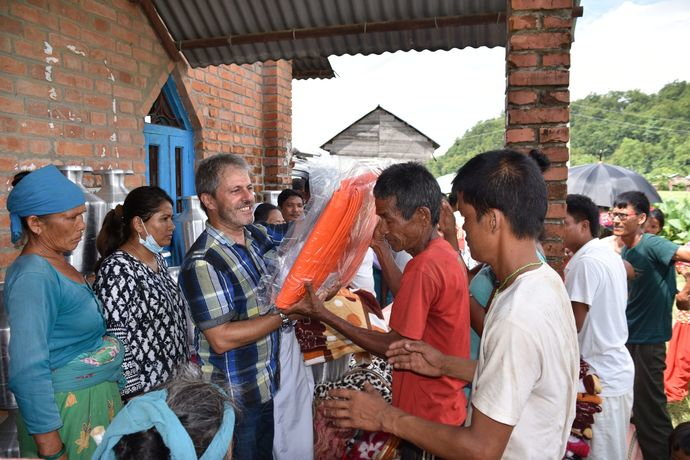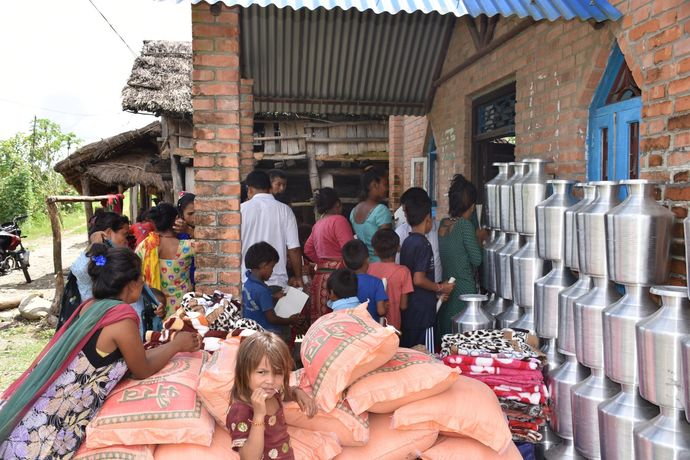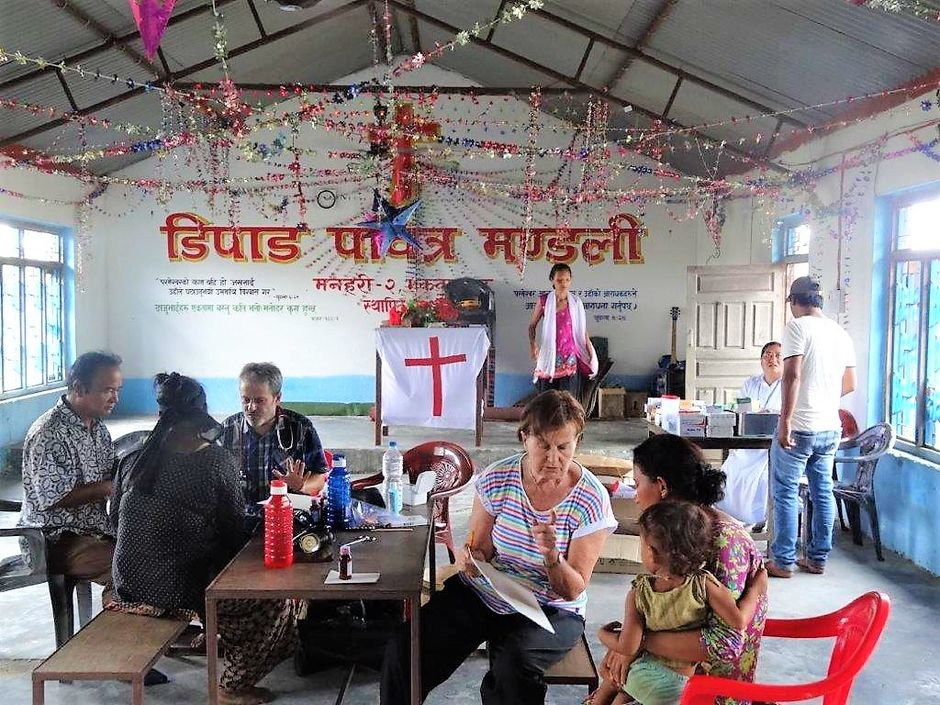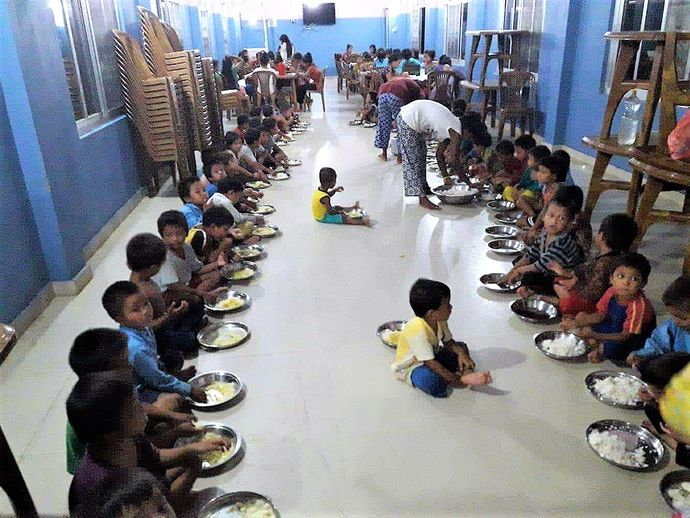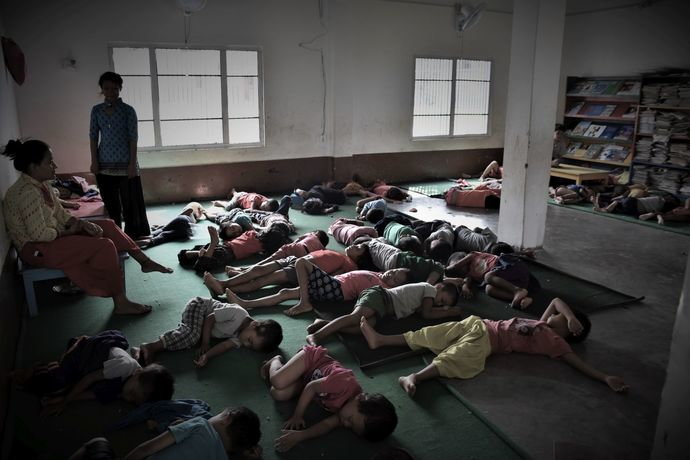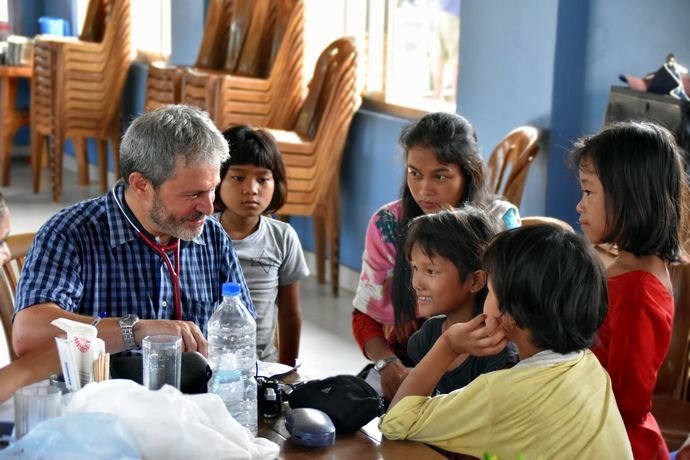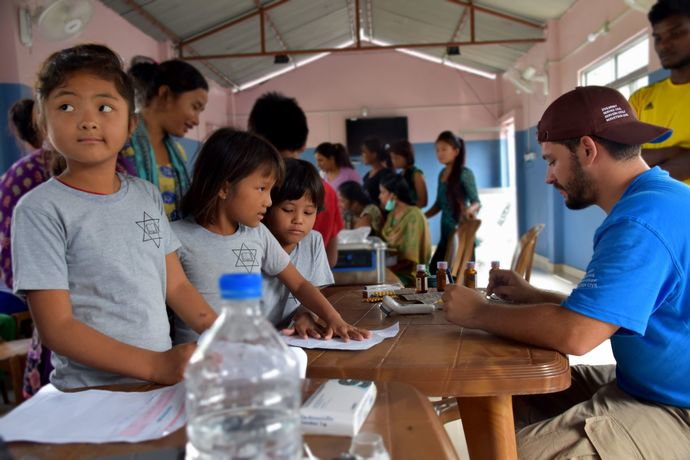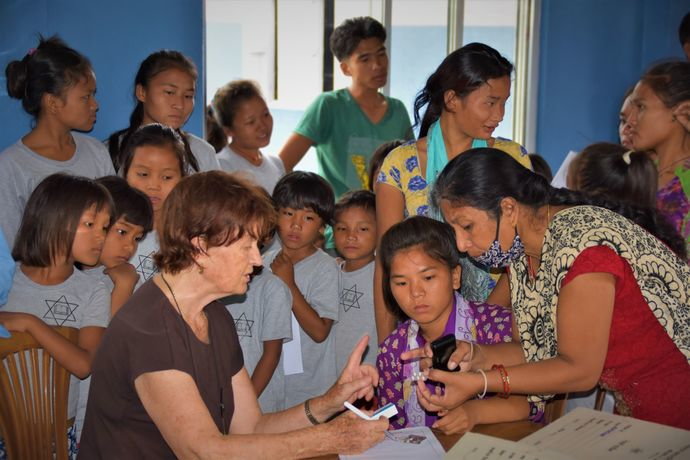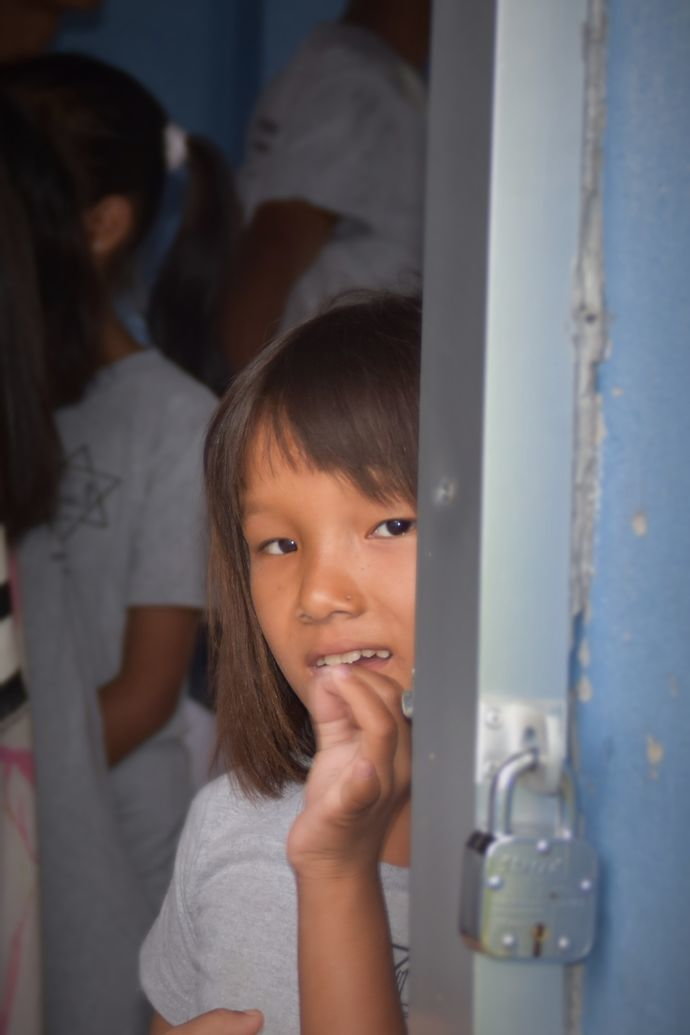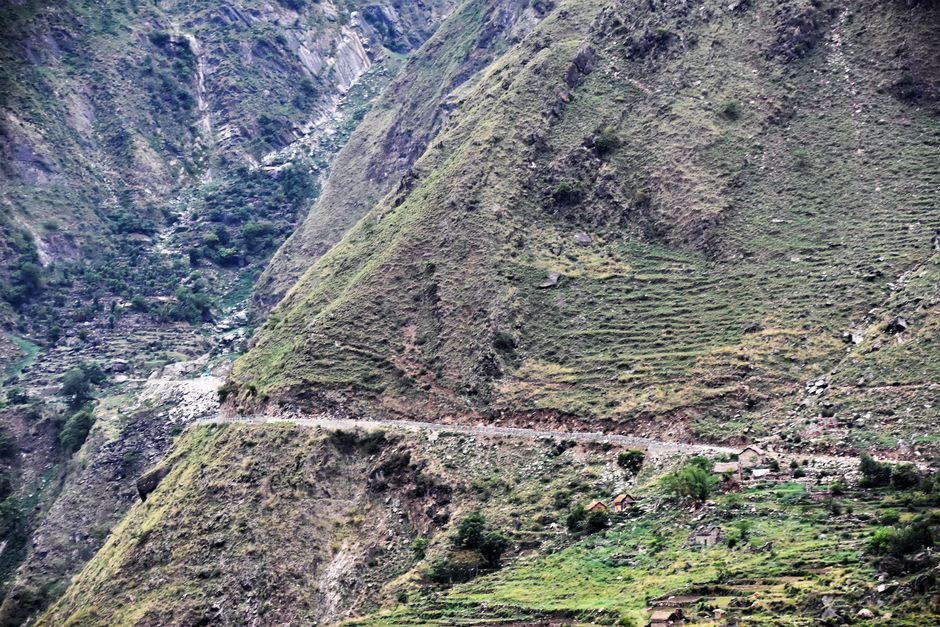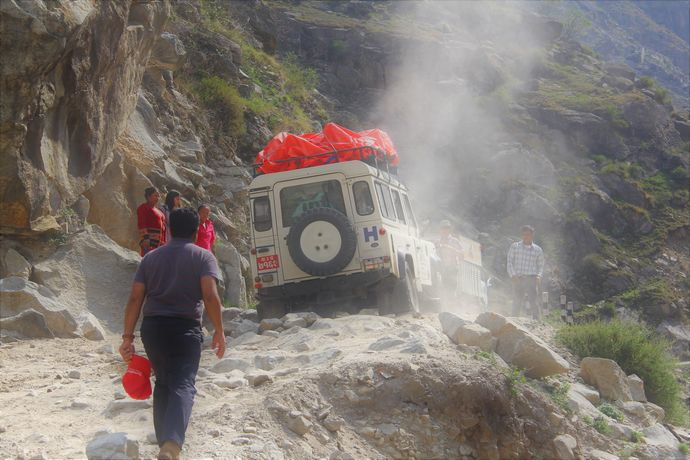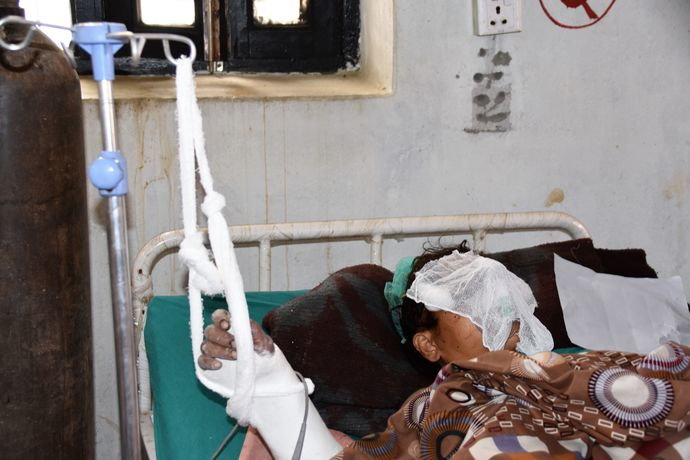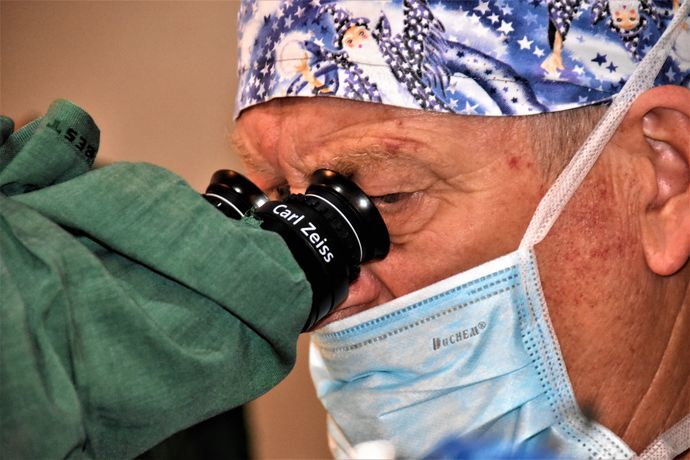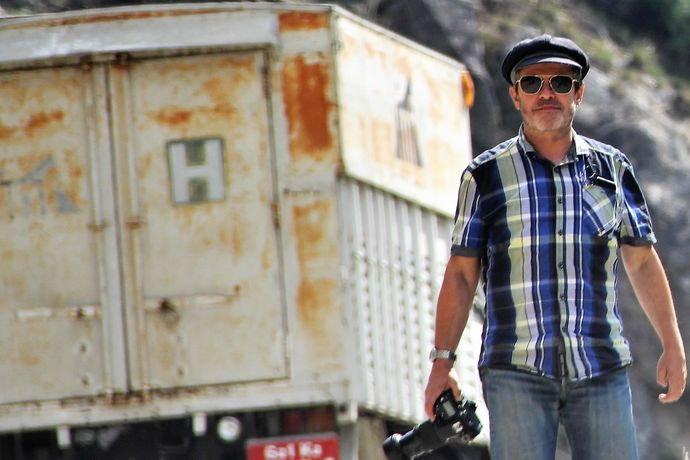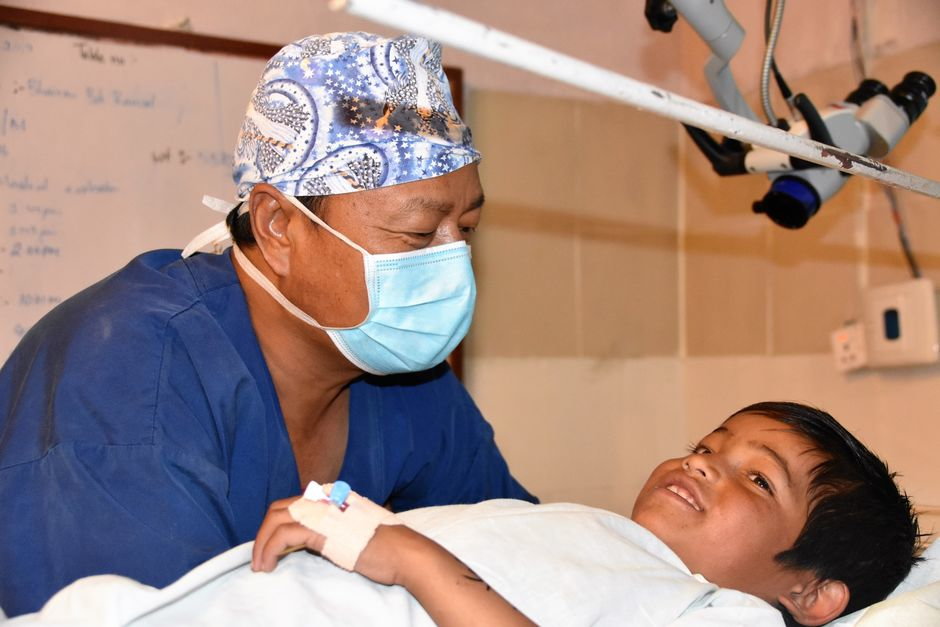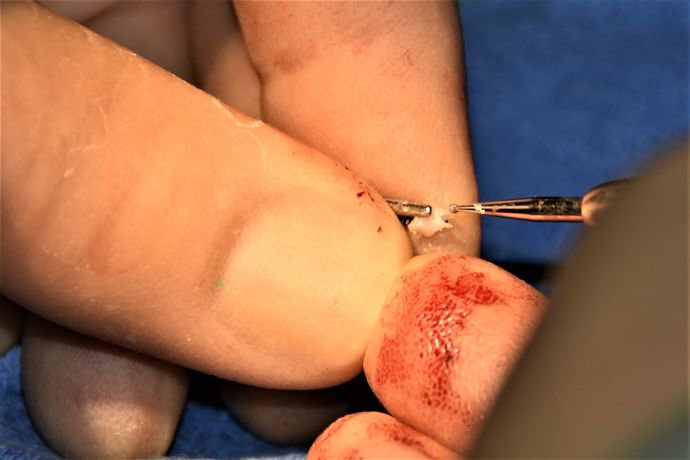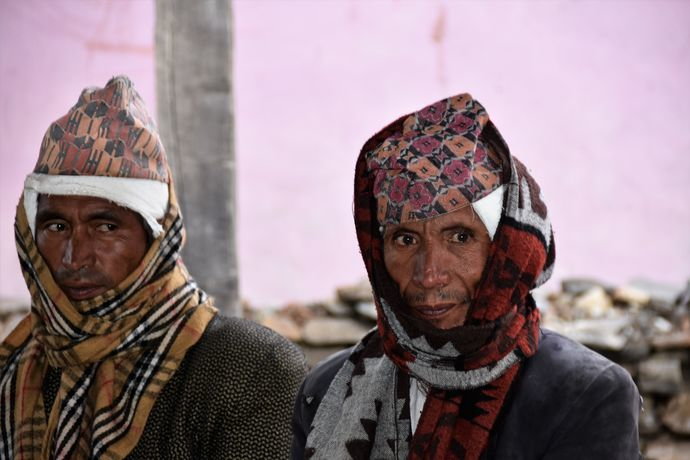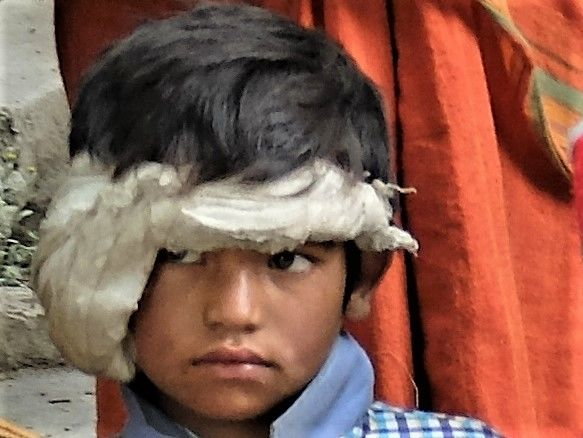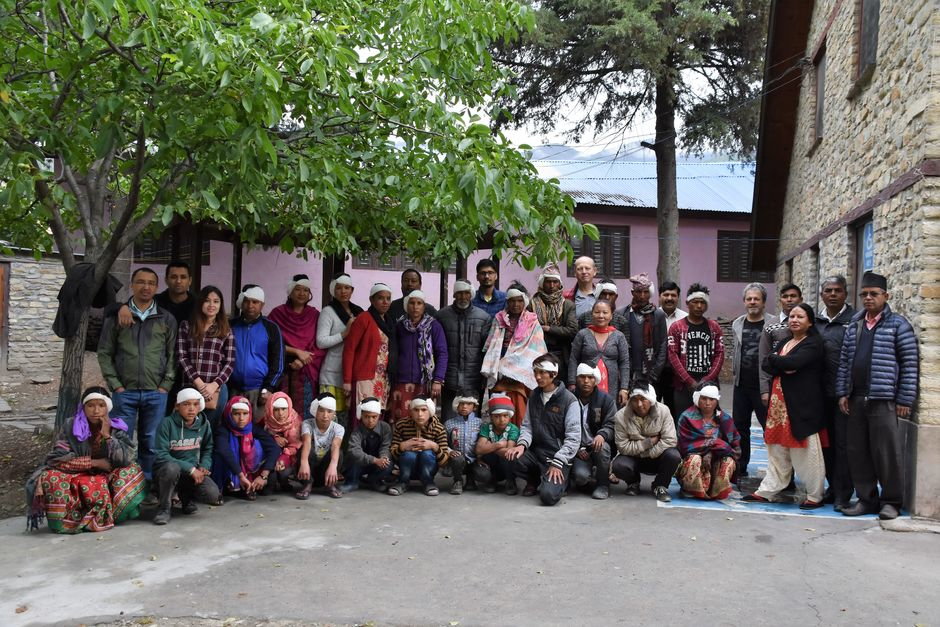Operation reports and activities: This is where we get involved
Miracles always happens, a review of the third running year of MedInCharge (March 2020)
“Miracles always happens in
our projects”, ...Bobby Anthony keeps on call out. The manager of Antyodaya Chepang School is an unshakable optimist. At least for the work of our small association MedInCharge and his school, which we accompany and support since its foundation, this seems to be true. However, in view of the consistent application of this philosophy,
sometimes I have to handle obstacles with Bobby. So, I hardly can talk to him about difficulties in our project work. He immediately refers to the "Miracles" (which will happen in future) and thus, according to his way of thinking, everything is comprehensively and conclusively discussed. To the Miracles that have occurred in the past year to the MedInCharge:
Miracle one: What MedInCharge was able to do last year thanks to your support in needy Chepang communities
The purchase of the new off-roader, thanks to a single donation in spring 2019, is one of the most important strokes of luck MIC could record. We are now entering regions and settlements which seem to be forgotten by the world. Again and again these severely malnourished children, far away from any perspective or future. The indescribable poverty and misery that is revealed to us, strongly sags our mental reserves.
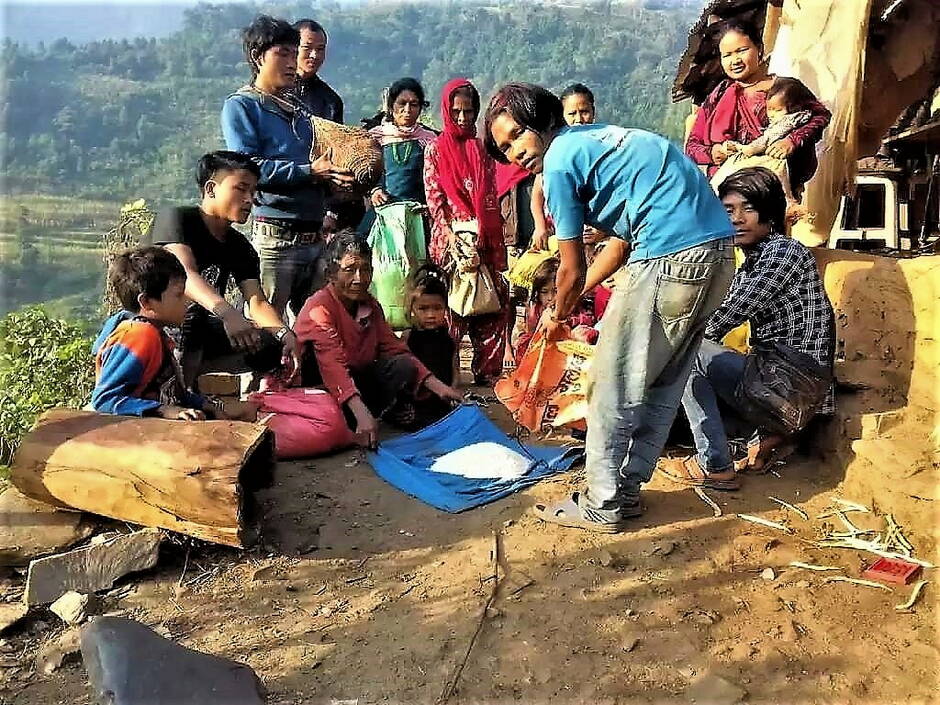
Torquai residents distribute the rice after carrying the 30 kg bags up the mountain for 8 hours to their village
Finally this is precisely what we are changing. In 2019, we conducted health camps in more than twenty villages in constant company of the experienced sisters of the Divya Jyoty community and a well-rehearsed team, reaching several thousand families. The villages of Torqay and Pangthali are supplied with rice and dhal (lentils) on a monthly basis, and success has been achieved. To meet the children of Torqay in a regenerated nutritional state after six months of rice delivery was one of the deeply moving moments of my work in Nepal last year.
My accident with a shoulder fracture in February 2019, which prevented me from working in Nepal for several weeks, is booked under the negative balance of the Miracles.
The same girl. 9 month old, weighting 4 kg in April 2019 and the whole family of normal weight in November 2019, 6 months after monthly rice deliveries (the girl in her mother's sling)
Miracle two bears the name Antyodaya Chepang School
Sometimes we are concerned about the conservative family structures in Nepal, which are culturally strongly influenced by India. Unfortunately, it happens again and again that young people get married after twelve years of schooling or their parents prevent them from attending secondary school because they want their children to support the family. Here we are reminded how great the need for development cooperation in Nepal still is. In the spirit of Francis of Assisi, we daily use our strength to change things that we can change, and we practice serenity in accepting things that we cannot (yet) change. And it works. In the past three years we have changed a lot: Where three years ago there were only a few dilapidated buildings, now there are living 200
Chepang children. They are holistically cared for by a well-rehearsed team of cooks, teachers, tutors and a nurse. Thanks to sponsorships from members of MIC, the first young people are already in the process of completing their further studies as nurses or in other fields.
Insights into the school area of Antyodaya: spring 2017 under construction and in March 2020 with the newly opened playground
We have not yet reached our goal with the sponsorships in Antyodaya
Almost 60 individual sponsorships now cover 30% of the school's running costs. In order to relieve the school from the deficit guarantee of our association, more than one hundred additional sponsorships are required. Here too we trust in the upcoming Miracles. You are invited to help us perform the next miracle. After filling out the sponsorship form (see below) on our homepage, MIC
will assign you an individual godchild who can be contacted personally. In order not to financially benefit any individual child, the sponsorship contributions are paid into the school's common maintenance fund. It is possible to retire from sponsorship at any time, because MIC covers the outstanding balance of the school. The monthly support or sponsorship costs 50 US$ per child.
Finally, a few figures on the third year of operation of MIC
2019 we registered 145,088 US$ incoming donations. Of this amount, 64,000 US$ were a contribution from the Lottery Fund of the Canton of Berne in Switzerland. These are huge sums that far exceed all our expectations. We thank you sincerely and heartily for your support and are aware of the great responsibility we have in managing your contributions.
We have invested 66'537 US$ in the running of Health Camps, including the purchase of the above-mentioned off-road vehicle, which cost 50'000 US$.
In 2019, the cost of medicaments amounted to 6'904 US.
In 2019, around CHF 85,000 was spent on the expansion, construction and maintenance of the Chepang schools. Last year, individual sponsorship contributions accounted for over CHF 19,000 of this amount.
All annual reports can be viewed on our homepage. The MIC Board is at your service at any time for additional information
Fredi Bacchetto,
President MedInCharge
Unless you do: I support a child in Antyodaya with a sponsorship
Contribution to our projects or even a sponsorship:
IBAN CH48 0900 0000 8975 4784 8,
MedInCharge, Chroslenweg 9, 3177 Laupen
or by Online form under https://www.medincharge.ch/en/contact-sponsoring
or by simple message to fbacchetto@medincharge.ch
We are happy about every contribution!
Just turn the page or zap away is not possible !
The girl in the picture is nine months old. She weighs less than four kilograms. The child is completely apathetic, the whole body is covered with skin folds because there is no fat and hardly any muscle underneath. The belly is bulging and as a result of the extreme lack of protein it is swelling up with fluids. The girl suffers from a severe marasmus and is in acute danger of life.
Dramatic conditions in Torqay
She can no more be saved in Nepal. The child was brought to us during a health camp a few weeks ago in Torkay. We were only able to reach the place with our new Off roader after a dangerous drive in the high mountains of the Makwanpur district (see video photo gallery). The devastating earthquake in Nepal had destroyed the access roads to Torqay in 2015. Even four years after the event, the government has not yet managed to reconstruct the roads. The populationcan no longer go down to the valley to sell their few products and are hopelessly impoverished as a result.
The longer I am in Nepal, the more the abysses of misery and horror open up to me in this country. For the description of poverty in Torqay there are no words.
The longer I am in Nepal, the more the abysses of misery and horror open up to me in this country. For the description of the poverty in Torqay there are no words. Never before I've seen so many emaciated people in one place. Never before have I seen so many severely malnourished children. Over 300 families live in Torqay.
Of course, I know the pictures from the media reports of the famine in Sudan, Somalia, Ethiopia and what they are all called. But here it is different. The children I hold in my arms are real. Just turn the page or zapping away is not possible. In Switzerland alone, we throw away over 250,000 kilograms of wholesome food every hour. Imagine that: Six articulated lorries full, hour after hour, every day of the week. How is this possible?
When the village leaders say goodbye in the evening with grateful words, many of us have tears in the eyes. The misery in this place forgotten by the world, is hard to bear. Our hearts are bleeding.
In the meantime, MedInCharge and the Sisters of DJC have provided Torqay with a large load of rice as emergency aid. Due to the destroyed access roads, the residents have to carry the heavy sacs on their backs for several hours.
They are very grateful to us. So am I. Your donations make this possible
With us also Sudip was allowed to join the way home. After an insect bite, the nine-year-old had developed a large chronic and open wound that stretched more than ten centimeters across his neck. With big eyes he watched the action from the front seat of the off-roader. He had never driven a car before! In our base station Sudip was taken care of for two weeks by our nurse from Switzerland, Aline Maurer. Afterwards, Aline's several week job came to an end and Sudip moved to the Antyodaya Chepang School.
13 health camps and 1,900 people cared for in April 2019 alone
After I was able to return to Nepal in April this year, we conducted 13 health camps in short succession in Chepang settlements and at the schools of Navodaya and Antyodaya. I was always accompanied by the Sisters of the Congregation "St. Joseph of Cluny" and other helpers of the community.
By the time I returned to Switzerland, we had examined and treated 1,900 people, half of them children. From the many impoverished Chepang settlements we were able to bring 50 additional children to Antyodaya.
The increase of the school was made possible thanks to the generous support of the Lotteriefonds of the Canton of Bern. We are very grateful.
The thirteen-year-old severely handicapped girl lives in the wooden shack shown - together with six other siblings and her mother. We have brought two girls from this family to the Antyodaya School
We have edited our work in the Health Camps on a video. The recordings were made in April this year.
The video can be viewed either on YouTube
https://youtu.be/9Pyv4j0IHi8
or in the photo gallery of our homepage
https://www.medincharge.ch/en/photo-gallery
We work on a small scale - but sustainably
When the children enter school, the ideal course of the MedInCharge project idea comes to an end: With our camps, we provide the parent generations with medical help and food. By transferring the children to the Antyo¬daya School, we provide the children with clothing, shelter, food and education. The children are to be supported until the end of their school education with a vocational diploma and thus with a livelihood.
No utopia: The oldest students who joined the school when it opened in 2017, are about to complete their diplomas in nursing and information technology. The school is constantly working on increasing its autonomy. Thanks to donations from friends of MedInCharge, the school has recently been able to increase its herd to seven cows. This means that Antyodaya is now producing enough milk to give all the children a glass every day. A very important source of protein and calcium during the children's growth period.
The demand for our help far exceeds our possibilities. MedInCharge is a small association. All the fundraising, logistics, administration and operations themselves are carried out by a very small number of volunteers. Our border is not the sky, but the finances: With your very valuable donations we can now finance well the described Medical Camps. The survival of the Antyodaya
School can only be secured from 2020, however, if we recruit a further hundred sponsorships.
Without additional sponsorships the future of Antyodaya is not secured
In conversations with friends I notice that the assumption of a sponsorship is not particularly popular. It seems that many of you are deterred from making regular payments. I can understand that well, I often feel the same way. We try to counteract this circumstance with a kind of guarantee of our association: A withdrawal from the sponsorship at MIC is possible at any time and with a simple mail to MIC or me. At no time does the support of a child break off after the sponsorship has been suspended. The association guarantees the education of every child in Antyodaya at all times.
And the sponsorship has a very nice downside for the sponsor: The assigned godchild has a name and does not only exist virtually. Sometimes an enriching exchange develops between the children of the sponsoring family and the child in Antyodaya. The Internet and Google Translator make this possible. For MedInCharge, however, a sponsorship means invaluable security: We never know how many donations we will receive at what time. A sponsorship is a great planning security for us. We take our responsibility towards the children in Antyodaya very seriously and secure financing makes us sleep much more peacefully.
Heart full thanks for your donations and immaterial support, which we experience without interruption from you.
Fredi Bacchetto,
Board Member MedInCharge
Unless you do: I support a child in Antyodaya with a sponsorship
Contribution to our projects or even a sponsorship:
IBAN CH48 0900 0000 8975 4784 8,
MedInCharge, Chroslenweg 9, 3177 Laupen
or by Online form under https://www.medincharge.ch/en/kontakt-unterstützen-patenschaften.
or by simple message to fbacchetto@medincharge.ch
We are happy about every contribution!
All board members and volunteers of MedinCharge, both in Switzerland and in Nepal, work for free. 100% of the donations are used for the financement of projects and benefits directly to the needy Nepalese population.
Review of the second operating year of the MedInCharge MIC association (March 2019)
From a dialogue at the X-ray department of a clinic in Berne on 6 February 2019:
X-ray assistant to the elderly man with the arm sling: «Skiing? »
Older man with the arm sling: «No, motorbiking. »
X-ray assistant «Ooohh», .
...after a rather thought-provoking break somewhat insecure: «In winter? »
Older man: «No, in Nepal. »
X-ray assistant «Ooohh», ...
On the night of February 2, 2019, on the short way home from Navodaya School, a heavily drunk man suddenly emerges from the dark in the middle of my lane. Despite my low speed, I can't completely avoid him and fall with the bike onto my right shoulder. The man wears a few scratches off. For me it's a complicated fracture of the right shoulder.
So now I find time to write the due annual report of our association activities.
We look back on a very pleasing year. We received 131,949 Swiss francs in donations. We owe this impressive amount to you friends of MedInCharge, but also to the generosity of a foundation from Central Switzerland (CHF 36,000) and the Catholic Church in Bern, as well as a selfless individual from Northwestern Switzerland (CHF 50,000). 100,014 Swiss francs flowed into our project work in 2018 and the balance of the association's assets on 31.12.2018 was 97,493 Swiss francs. We were thus able to enter the third project year on a solid financial basis. We are proud and amazed. We would never have dared to dream of being able to move so much as a small family association.
A summary of our financial statements for 2018 can be found on our homepage.
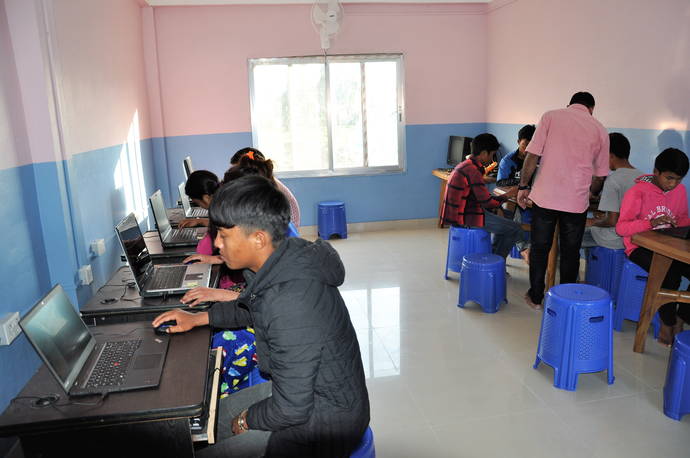
A big insurance company left us twenty laptops. These fully functional laptops are extremely useful in Nepal. We use a large part of them at the Chepang schools. Many children come into contact with computers for the first time and learn to communicate with the outside world.
The Antyodaya Chepang School on an expansion course
Thanks to increasing sponsorships and donations, MedInCharge was able to cover the operating costs of the Antyodaya School last year. The association's reserves now allow a prudent expansion of the educational institution. The school purchased cows and geese, set up a large fishpond and planted lots of protein- and carbohydrate-rich vegetables. This allows the hostel to contribute a considerable amount of self-sufficiency. The school should be able to run autonomously
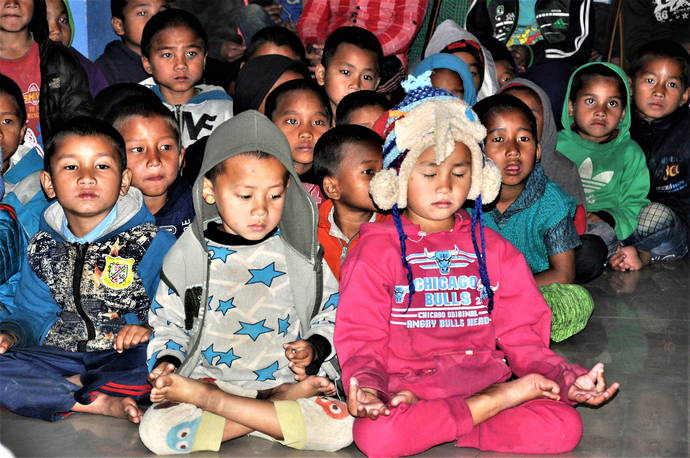
in a few years. The Antyodaya School makes an eminently important contribution. For the first time in their lives, the school offers education to this children and young people. Thus, the children get a fair chance on the long way out of poverty.
Health Camps for the Poorest in Nepal
The children in Antyodaya come from the poorest backgrounds. MedInCharge is therefore committed to support the generation of parents too. On average, we conduct health camps once a month in the impoverished communities of the Chepang. Thanks to a single donation from a person in Switzerland, we will be able to purchase the urgently needed off-roader in the coming weeks. Now we can reach the remote communities safely. We bring medical supplies and clothing to the settlements. Whenever possible, a small truck accompanies us and carries a ton of rice. It is very close to me when we set up our treatment stations after long exhausting journeys between the shabby tarpaulins. We see women drawn by the daily struggle for survival. We look into the big eyes of the malnourished children in their torn clothes, meet people marked by chronic infectious diseases and parasites. The vast misery of these communities can hardly be described in words. Isn't it our duty to give these underprivileged people something of our abundance?
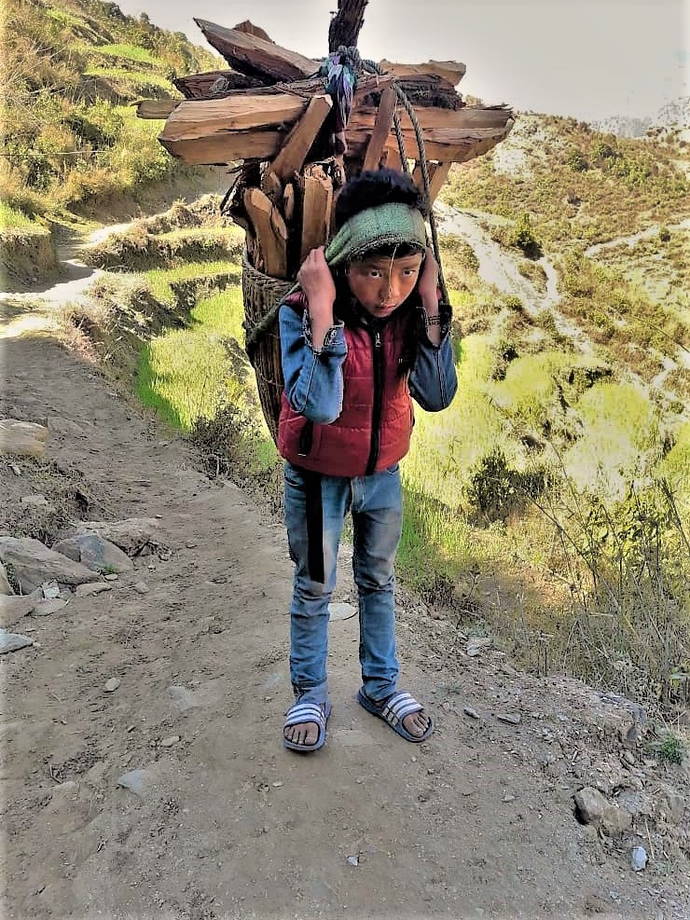
Last year we ran 13 health camps and were able to care for over 2,000 people. A load of 1,500 kilograms of rice costs 1,000 Swiss francs. An entire camp costs 2,500 francs. The accompanying team ideally comprises two doctors, a dentist, three nursing staff, three drivers and about six other helpers. The camps were financed by MedInCharge. This work is only possible thanks to your donations. Thank you so much!
We also get active support from my colleague. Dr. med. Ruth Gonseth and her Ratnanagar Hospital. Unfortunately the completion of her new building in Ratnanagar has been delayed for more than a year now.
Recently the Antyodaya School can also be reached by mail. Various godparents have already sent parcels which arrive after an average of 10 days. The address:
(Bobby Anthony)
Post Box No. 83
Khairahni-9
Chitwan District, Nepal
Mail to “bobbyantoni78@gmail.com”
Fredi Bacchetto,
Board Member MedInCharge
Contribution to our projects or even a Sponsorship:
IBAN CH48 0900 0000 8975 4784 8, MedInCharge, Chroslenweg 9, 3177 Laupen
or
Online form on https://www.medincharge.ch/fr/contact-soutenir-parrainages
We are happy about every contribution!
All board members and volunteers of MedinCharge, both in Switzerland and in Nepal, work for free. 100% of the donations are used for the financement of projects and benefits directly to the needy Nepalese population.
It is a mistake to think that daily confrontation with misery makes it easier to endure suffering (December 2018)
Which core tasks should a doctor perform? Maintain health? Heal illness? To avert death? During my last stay in Therai Nepal I visited a woman about forty years old several times. She lives in a lonely wooden shack on the edge of the jungle along the Rapti River. Her whole face is cruelly deformed by a huge cancer that is spreading inexorably. An unspeakable despair befalls me as I enter her hut. My work in Nepal is associated with numerous moments of great impotence. It is a mistake to think that the daily confrontation with misery makes it easier to endure suffering. Moments of desolation are an integral part of the work of a doctor in Nepal.
"It is incumbent upon us to accompany our sick fellow men in a difficult phase of their lives"
The quotation comes from Gian Töndury, former anatomy professor and rector of the faculty of medicine in Zurich. How true. When all the medicine in the world fails, I reach out to the patient and ask with him for the serenity to accept things that we cannot change. Accompaniment in moments of overwhelming hopelessness helps the patient to build bridges over the abysses of misery.
Many Chepang are still forced to live in tent settlements in the jungle along the Rapti River. By 2017, the monsoon floods had snatched all their belongings from many of them. They receive no help from the government. On the contrary, they have recently been accused of illegally colonizing state land. Between the trees there is no land for cultivation and the areas are far from any medical care. Before my home leave, we again carried out numerous camps in the slums of this very disadvantaged population group. At least every few weeks they receive some rice and medical care.
At the moment we can only visit the Chepang with inadequate vehicles without four-wheel drive. This always puts us in critical situations. When we get stuck in the soaked and muddy paths, the accompanying sisters don't just trust in God: they get out and push hard. If we want to do good work safely, we have to improve our logistics. We will therefore invest a lot of energy in the following months in collecting donations for a 4x4 drive vehicle.
The school leads out of poverty
In the schools of Navodaya and Antyodaya, near our base hospital in Ratnanagar, so many Chepang children are cared for as infrastructure and finances allow. MedInCharge has employed Sarita Masrangi, a young Chepang woman who now works as a health nurse at both schools. Sarita grew up 13 years ago in Navodaya and recently graduated as a nurse in Bharatpur. A success story with sustainability. Congratulations Sarita!
Some children of Antyodaya are still looking for a sponsor to provide them with an education. Education leads out of poverty, as the example of Sarita shows. The children have prepared drawings which will reach your mailboxes in the coming days as a Christmas greeting from the school.
When all our Christmas wishes are fulfilled and friends and relatives have received their presents, the remaining budget may allow a contribution to our projects or even a sponsorship:
IBAN CH48 0900 0000 8975 4784 8, MedInCharge, Chroslenweg 9, 3177 Laupen
or
Online form on
https://www.medincharge.ch/en/contact-Sponsoring
We are happy about every contribution!
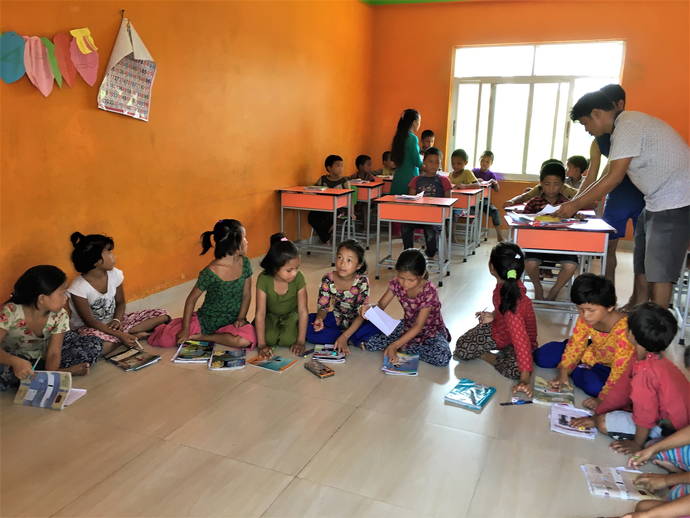
Christmas is coming. Time for reflection, for looking back and perhaps also for expectations of the new year. Faith can strengthen. We should have more faith. Those who believe stretch a rope between two certainties: Our existence is only a small flashing between two points in the eternal cycle of time. We were born and we will die. This rope connects two eternities beyond our power. Between them we spin the thread of our life, love and suffering. Those who believe assume that the balancing act has a meaning and that this meaning can carry us.
In this spirit we wish you all a reflective holiday time
Fredi Bacchetto,
Board Member MedInCharge
All board members and volunteers of MedinCharge, both in Switzerland and in Nepal, work for free. 100% of the donations are used for the financement of projects and benefits directly to the needy Nepalese population
Looking for 200 godparents for the children of Antyodaya Chepang School (September 2018)
Immediately after my arrival in Nepal in mid-September, all the professional drivers in the country went on strike. The government had announced the introduction of a new law for the chauffeurs, which would have made them financially responsible for the numerous and horrendous traffic accidents. The government reacted to the withdrawal of the drivers with the archaic instruments of their Maoist party book and announced a general counter strike for all motorists. Taking part in these kinds of riots is not optional in Nepal. Indeed, if you were to refuse, you get arrested by the police. So once again, almost nothing was moving in Nepal. At first, I was able to count myself among the lucky ones as my motorcycle wasn’t concerned by the strike regulation and, as a biking doctor, I could continue to offer my services within a radius of a few kilometers. However, only briefly: Without truck drivers there is no gasoline delivered to the stations and using the applicable laws of internal combustion engines that are also valid in Nepal, my Renegade stopped after about 300 kilometers.
In a developing country, such inconveniences need to be endured with serenity. We are committed to helping the poorest sections of Nepal’s population. Through health camps in the mountains and jungle settlements of the Chepang, we provide the parent’s generation with medical care and food. MedInCharge is particularly involved in the Antyodaya Schoolwho opened in 2017. For the time being 200 Chepang children receive food, clothing, medical care and education.
To ensure the future of the Chepang in Antyodaya, we have decided to establish an
individual sponsorship for each child. We are in the process of setting up an IT room for the children with second hand computers from Switzerland. The Chepang should learn as early as possible to deal with these important means of communication in the third world. We are would like to invite you to enter into a dialogue with a child in Antyodaya. If you sign up for a sponsorship, we will give you the
personal address of the assigned sponsored child and you can contact him if you wish. Google translator in English is totally enough for a meaningful exchange. The duration of your sponsorship is up to you and you can withdraw at any time. In this case, MedInCharge guaranties for the support of the child concerned without interruption.
Yes, I’ll take part in a sponsorship and invest 50 francs per month in the future of a Chepang child:
--> either via the online form under
https://www.medincharge.ch/fr/contact-soutenir-parrainages
--> or by e-mail to fbacchetto@medincharge.ch stating the contact address.
--> Or by post stating the contact address to
«Cristina Bacchetto, MedInCharge, Chroslenweg 9, 3177 Laupen»
Finally this:
A few months ago, Shaison P. Ouseph shot a touching film at Antyodaya School. Our son Tobias, my dear colleague Ruth Gonseth from Shanti-Med-Nepal and myself participated in it.
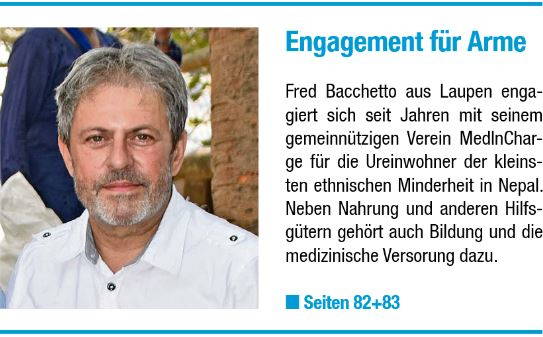
The Newspapers of Köniz and Sensetaler dedicated an article to the work of our association MedInCharge in their September issue 2018 (in German):
Here the Link to the article:
As usual here the link to more pictures in our photo gallery on our homepage:
https://www.medincharge.ch/de/photo-gallery
All board members and volunteers of MedinCharge, both in Switzerland and in Nepal, work for free. 100% of the donations are used for the financement of projects and benefits directly to the needy Nepalese population.
We are happy to accept all contributions at
IBAN CH48 0900 0000 8975 4784 8,
MedInCharge, Chroslenweg 9, 3177 Laupen.
We send you warm greetings
For the Board MedInCharge
Fredi Bacchetto
Chaainaa !! (June 2018)
"Chaainaa" in Nepali means "not available" or "does not exist". In Nepal, "Chaainaa" is rarely associated with a solution to the non-existing. In Switzerland, I can’t identify any "Chaainaas". Nearby Bern offers everything my heart desires, both materially and immaterially. If something is missing in the offer, I can order it without delay on the Internet and it is posted the same day. In Nepal, the Internet connection is more often disrupted by the many power outages than available.
On the terrace in front of our house in Laupen, the tranquillity is overwhelming when I lie in a deck chair. No deafening clattering tractor trailer, which thunder without interruption on the large aisles on the road surface. No stressful horns, which makes me want to jump away from the road. In traffic, everything runs according to well-defined and beyond-complied rules and the movement is possible without increased risk to life and limb. In the morning I wake up on a soft mattress, get a newspaper from the mailbox and sit down at a richly set table for the morning meal.
On Summer Leave in Switzerland
I’ve been back in Switzerland for a summer leave since a few weeks. At the same time, increasing monsoon rains are rising in Nepal. We can only hope that they will not destroy as many existences as this 2017. Along the Rapti River in Nepal, thousands of families of the Chepang tribe were deprived of their existence less than twelve months ago. Since then many of them are living in tent settlements in the jungle along this river, with no land for cultivation and no medical
care. If they are lucky, from time to time a few 4x4 vehicles appear. They bring urgently needed rice, medicines and healthcare professionals. For a few hours, a health camp will be set up and several hundred people will be examined and treated by a doctor. They have even better luck if a child can be sent to one of the big Chepang schools near the Ratnanagar Hospital. Per family, a maximum of one member aged of four and over is admitted. The schools provide food, clothing, housing, education and important medical care to the children.
The Chepang always in the main focus of MedInCharge
MedInCharge invests many resources in the care of the Chepang. As doctor, I have been assisting over a dozen health camps in Nepal since the fall of 2017. Sometimes my colleague and dermatologist Dr Ruth Gonseth is with us. We owe her much support in critical moments thanks to her many years of experience in Nepal and the patronage of their association Shanti-Med-Nepal through the Ratnanagar Hospital. At many other health camps, I was accompanied by the small community of Sisters of St. Joseph of Cluny and their friends. In the periphery of Hetauda we visited numerous remote mountain villages, slums or jungle settlements in the spring of 2018 and supplied over a thousand people in a short time. I have great respect for the sacrificial devotion of these young Sisters.
Our biggest support among the Chepang Schools still requires the young Antyodaya School of Bobby Anthony. As the school continued to grow in self-sufficiency, our monthly allowances were recently reduced by $ 1,000. In order to maintain the basic operation, the school nevertheless relies for a long time on the financing by third parties. In particular, fair wages for teachers are a major concern. So, they stay motivated to do a good job and benefit the young Chepang. Our investments in the Chepang Schools are sustainable help for self-help. With the help of numerous volunteer assignments from my family and friends of our association, we achieved a very satisfying situation at large Chepang Schools in the area around Ratnanagar Hospital. For more information I refer to our last newsletter in March of this year.
It is crucial to secure the financing of our projects
We have booked our next return flight in the hot Chitwan of Nepal for the 13th of September 2018. We dream of landing with secured finances for our little Chepang in Kathmandu. We dream of providing food and medical help to their destitute parents. For that we need your support:
• A health camp costs around $ 2,500.
• A pickup load of rice (750 kg) costs US $ 500.
• The salary of a teacher or nurse is US $ 130 per month.
• Our medicines for the Chepang Schools cost US $ 100 per month.
• A sponsorship for the further education of a young person costs US $ 50 per month.
Nisam, left, 14 und Dipesh, right, 17 depend on sponsorships to continue their studies (Contact adresses over fbacchetto@medincharge,ch)
All board members and volunteers of MedinCharge, both in Switzerland and in Nepal, work for free. 100% of the donations are used for the financement of projects and benefits directly to the needy Nepalese population.
We are happy to accept all contributions at
IBAN CH48 0900 0000 8975 4784 8,
MedInCharge, Chroslenweg 9, 3177 Laupen.
Here is the link to more pictures in our photo gallery on our homepage:
https://www.medincharge.ch/de/photo-gallery
We send you warm greetings
For the Board MedInCharge
Fredi Bacchetto
Review of the first operational year of the association MedInCharge (March 2018)
Dear friends
The first operating year of our association MedInCharge is coming to an end. Time for a quick review.
In first place, we have to thank Dr. Ruth Gonseth and her association Shanti-Med-Nepal (SMN). Through her active support, Ruth has made it much easier for us to get started in Nepal and has opened doors for many projects.
The new Bakulahar Ratnanagar Hospital, financed by SMN, reached its highest point a few days ago in the construction of the foundation. This, however, with customary delay of more than a year. We are all looking forward to moving into the new building, so that we can finally escape the increasingly narrow spaces in the old building. Optimists (Nepali) think this should be possible in 2018. For the latest report on the construction situation, we refer you to the homepage of SMN.
During the first operating year, MedInCharge invested almost 100'000 Swiss Francs in the local primary care in Nepal
No doubt, this was made possible by the generous donations of our friends, patrons and sponsors. You all deserve our sincere and heartfelt thanks. Your solidarity is the resource from which we recharge in the face of the oppressive situation in many regions of Nepal, courage and strength.
The Antyodaya and Navodaya Chepang Schools
All in all, more than 400 underprivileged Chepang children aged between 4 and 17 attend these two schools. The Navodaya School is well structured after more than ten years of operation. Under the direction of Bobby Anthony, an enthusiastic, warmhearted man, Antyodaya was able to outgrow itself.
The main energy of MedInCharge this year was directed at Antyodaya. Through the account of MedInCharge, CHF 50'000 were invested into Antyodaya school in 2018. For the ongoing operation of the big school, we have to secure 6'000 CHF per month. Thanks to very generous donations from the foundation Nelumbo and Nepalhilfe e.V. Bonn, we can guarantee the operation of the school until the end of the year. We regularly carry out extended medical visits in Antyodaya. The big enemies in the medical sector are lice, scabies, mycoses and infectious respiratory diseases. After nine months of activity in the school, the health status of the children can now be qualified as good.
In a record time, an in-house fish farm, a garden and a chicken farm were set up. The school also has dairy cows. The important protein supply for the children will soon be ensured by an independent production. The children and us are very happy about this.
Many advances in energetic support in the Antyodaya School are thanks to Tobias Bacchetto, who absolved his civil mission in Nepal. The school is aware about it and the farewell party was very touching in early March 2018.
And then this
Devastating monsoon rains have swept away many villages with all their belongings in the Therai of Nepal in 2017. The reconstruction assistance by the government is practically non-existent in this region. The older generations of Chepang had to retire after the disaster in very modest camps in the jungle.
For the maintenance of health posts, health camps, construction of destroyed villages, food and medicines, MedinCharge has spent
just under CHF 30'000 in southern Nepal since autumn 2017. Twice, under the auspices of Shanti-med-Nepal, we ran large health camps in the Chepang villages. These encounters mark us deeply and touches every volunteer in the heart.
We look confidently into the second operational year of MedInCharge
All board members and volunteers of MedinCharge, both in Switzerland and in Nepal, work for free. 100% of the donations are used for the financement of projects and benefits directly to the needy Nepalese population.
What more do we want: Thanks to your generous support from Switzerland, we have the great privilege of doing enriching and meaningful work in Nepal for both sides. The warmth of the Nepali population often compensates for our privations. The daily gratitude of the beneficiaries we pass on to you with great pleasure.
We are happy to accept all contributions at
IBAN CH48 0900 0000 8975 4784 8,
MedInCharge, Chroslenweg 9, 3177 Laupen.
For the direct support of needy young Nepali, we are happy to arrange direct sponsorships.
Here is the link to more pictures in our photo gallery on our homepage:
https://www.medincharge.ch/de/photo-gallery
We send you warm greetings and best wishes from the Chitwan
For the Board MedInCharge
Fredi Bacchetto
Situation report on Chitwan beginnig of December 2017
The last two months have been marked by many poignant events that underline the purpose of our association's activities. In addition to Tobias and Fredi, Christine and our daughter Cristina were also here, which brings us to a total of 80% of our family. Virginie Kormann and the dermatologist, Christina Emmenegger, also did valuable volunteer work (see Photo Gallery). A week ago, Urs Vogt, chief radiologist at Burgdorf (picture at right) Regional Hospital, joined us for a longer assignment. He immediately started with a lot of enthusiasm the advanced training in ultrasound diagnostics of the young assistant doctors at the Ratnanagar Hospital.
Expansion of support of Chepang schools in Chitwan by Medincharge
Whenever possible, the Chepang send their children to schools specially set up for them by NGOs, where they also receive shelter and food. Due to the big onslaught, these schools reach their capacity limits and it is a great challenge for all of us to secure infrastructure and basic medical care. The cramped space conditions make infectious diseases spread rapidly. Meanwhile, we look after more people in the schools, with more than 500 children and the numbers just keep rising.
At the end of October, the Chepang children returned from a few weeks holiday after the big Dashain festivities. As usual, they brought along with them a whole series of souvenirs that were less welcome, such as fungus, scabies, lice, bacteria and viruses. With the active support of all volunteers, we again examined in chord the hundreds of children and released them with a mass treatment, of all the large and small infectious creatures.
Thanks to many donations from Switzerland, beds for all children have now been made available in record time. This is a great prerequisite to effectively contain the epidemics. A large part of our resources are now absorbed by weekly visits to these schools in addition to the parallel running hospital routine.
The great emergency in Nepal after the floods in summer continues
The entire Chepang village of Chisapani was washed away with several hundred of houses during the flood in August. An uninhabitable sandy desert remains. Until the government allocates new land to these people, they are forced to live in temporary tents in the jungle. We organized a large health camp amongst them and treated more than 260 people in a single day. What we found there is one of
the most impressive things we have experienced and seen so far in Nepal. Poverty and misery are indescribable. The child in the picture below, with the bloated abdomen, suffers from, for example, Kwashiorkor, a severe disease of advanced protein deficiency. To remedy the famine, we left 50 bags of rice in the camp. Despite all that, people remain happy and adapt to the wretchedness. Children make playing balls out of waste bags that they fill up.
Tobias has installed a solar panel with local helpers, so that at least some people have some power again. Ruth. and Christina E. treated countless infectious skin diseases while Fredi, with an assistant from the Ratanangar Hospital and the Nursing Team, provided basic care to the remaining residents.
The arduous way home had us all very thoughtful. But also accompanied by the good feeling to have brought help in a few hours.
We are aware that at Christmas time countless relief organizations send donation requests and it is not easy for us to request help as well. To continue the work of this project, however, MedInCharge remains dependent on donations from its friends. The donations to MedInCahrge are tax-exempt. Our big thanks goes to all donors who make this important work possible for us.
The trademark of MedInCharge remains that all board members and volunteers in both Switzerland and Nepal work free of charge and we do not use funds for administrative purposes. The association’s money is used for the project work at 100% and directly benefits the needy population of Nepal. At the end of the year, we will write an annual report and publish the balance of cash flows.
We are happy to accept contributions to IBAN CH48 0900 0000 8975 4784 8, MedInCharge, Chroslenweg 9, 3177 Laupen.
Here is the link for more pictures in our updated photo gallery on our homepage: https://www.medincharge.ch/de/photo-gallery
We send you warmest greetings and best wishes for joyful festive days from Chitwan
Fredi und Tobias Bacchetto
Situation report on Chitwan end of September 2017
My son Tobias and I have resumed our work here in Nepal beginning of September. Our resources have quickly been absorbed by two critical events.
The section about Naya Basti is based on an article written by our colleague Dr Ruth Gonseth for Swiss medias.
Major emergency in Nepal due to flooding
The devastating flood came early in the morning at 4 am, tearing people from their sleep. A dam on the Rapti river couldn’t stop the water masses after the monthly monsoon weather anymore. The village of Naya Basti with about a hundred wooden huts was drowned by the flood within minutes. 37 houses were immediately swept away by the force of the water. The inhabitants lost all their possessions, the animals and the whole rice harvest. There only Ermines a vast sandy desert.
A farmer and his family behind de remainigs of his hut
Naya Basti in the southern district of Chitwan, is one of the many villages that were destroyed by the violent monsoon raids in Nepal at the beginning of August. About 50,000 houses are totally destroyed and 160 people have perished in the floods. It affects the poorest people in Nepal who build their houses near the banks of the rivers. This land belongs to the state, and they allow the poorest to build their simple wooden huts there.
Faced with the helplessness of the state, people depend on the support of local and foreign organizations. We have received many help calls. Thanks to the generous financial support provided by our partner organizations Shanti-Med-Nepal (Dr Ruth Gonseth) and the Swiss Foundation Nelumbo, we were able to provide help within very short time. In several villages, we helped with food, clean water, tents, blankets and clothes over the first difficult days. With the "Health Camps" we now also bring health care to the villages. In Naya Basti, we held our consultations for about 100 patients in the church, together with our colleague Dr. Ruth Gonseth. In front of the church, we distributed the relief goods. The plight of the people is very oppressive and we hope that the donation money in the account of the association will be enough for many more places.
Bad state of health at the Antyodaya Chepang School of Bobby Anthony
The "Chepang" are among the natives of Nepal and a small ethnic minority. An almost forgotten people, today one of the poorest in Nepal.
The Chepang were originally nomads who migrated from Tibet into the wooded mountain regions of Nepal.
More than 50 years ago, the then King ordered the civilization of so-called "primitive" aborigines. This was associated with a forced settlement in less elevated areas. The Chepang were thus deprived of their roots and traditions. They live today as poor peasants and hardly have any land. Today there are about 35,000 Chepang. The state is not in a position to offer the education of the Chepang children, which is why private aid organizations face this challenge. Demand is huge and exceeds the supply by a lot.
Bobby Anthony is a busy young Indian. He has set up a Chepang school in record time for over 200 children near our hospital. A few weeks ago, Bobby admitted the first 180 children to the school. The school's infrastructure is still spartan. The children eat and drink on the floor. They sleep closely together on the naked asphalt. Under such conditions, scabies, fungi, bronchitis, sinusitis, whooping cough, fever, chickenpox, and more spread epidemically.
Immediately after our arrival in the Chitwan, we received a call for help from Bobby because of many sick children. In a spontaneous health camp, we decide to examine all the children of the school and to provide medical care for them.
In front of us an endlessly long queue, which has not decreased by noon. Fredi and Ruth investigate child by child, while Tobias tries to secure the distribution of medication
with Tobias and assistants. Over 90% of the children have serious infectious diseases. The initially disciplined human chain is increasingly divided into parts, until we are all surrounded by countless curious children of all ages. The heartfelt sentiment is touching us all in our deepest interior. Nobody can escape the charism of a Chepang kids. The indoor temperature significantly exceeds the 40-degree mark in the afternoon. Nobody seems to have a problem with it. Besides us Europeans.
After discussing with Bobby, the infrastructure needs to be expanded immediately. We agree with Bobby that he will begin the construction of double beds immediately. Within three weeks it should be possible to provide a bed for all 180 children.
Medincharge secures a deficit guarantee of up to 10'000 Swiss francs for bed production. A double bed costs a little more than 80 francs. With a donation of 40 francs we can offer a regular sleeping-accommodation for a Chepangkind.
We gladly accept contributions under IBAN CH48 0900 0000 8975 4784 8, MedInCharge, Chroslenweg 9, 3177 Laupen.
To join our actualized photografic Gallery choose :
https://www.medincharge.ch/fr/photo-gallery
Report INF EAR-Camp Jumla,
18. to 30. Mai 2017
18.-21.5.2017
Pokhara, 6 o’clock in the morning. Departure for the Ear camp in Jumla. The place is located in Western Nepal at 2'400m altitude. We fight our way up through the Nepalese mountains with 2 Landrovers and a little four-wheel drive truck for 37 hours. First on acceptable roads, along imposing heights and steep gorges, via Tansen down to Butwal and then again sharply northwest to Nepalganj. First overnight stay in Surkhet, after 17 troublesome hours, often on off-road surfaces with potholes and rocks.
We take off again early in the morning. But after an hour, one of the Landrovers breaks down in the middle of the mountains. In vain, the drivers try to repair the gearbox problem with great effort. Finally, the car must be abandoned. The load is redistributed to the other two vehicles and a replacement car is requested. Four members remain behind, to travel together in the event of a further breakdown. The remaining two vehicles follow the course of the Karnali River in seemingly endless windings. After 16 hours, in the mountain village of Manma, in the district of Kalikot, at 2,500 meters above sea level, the team is finally reunited the next morning, at six o'clock. Those who were left behind are now in a smaller but newer and more reliable 4WD vehicle. And so, we continue.
Now the roads, or at least what the monsoon has left of them, are particularly adventurous. We drive through the most fantastic mountain formations, along narrow streets, ever deeper into the north-west of Nepal. To the left of us is the Karnali River, sometimes on the same level, then seen from dizzying height. Have you ever overtaken or passed a truck on a valley side, when the unsecured road is covered with slippery mud and just 30 centimeters wider than
both vehicles? The passenger has the opportunity to observe the river in question from the side window! The river flows through the rocks 1500 meters lower down, right at the base of a vertically sloping rock wall, which runs directly down from the edge of the road. Finally, we reach Jumla after a strenuous ride in the early afternoon. It is cold. There are no heaters. At the local bazaar, we all cover up with additional clothes.
Without delay, the team begins the establishment of the camp, which is set up on the site of an old hospital unit.
Saturday, 20.5.2017, 8 pm, Ear-Camp Jumla
We sit exhausted at supper, when Mike receives a help call from the operating room of the nearby regional hospital. A woman with a bad facial fracture after falling from a tree. Mike performes surgery on the lady until late into the night with the local team. What is impressive is the background story
of the woman. She lives with her husband and two children far away in the mountains. The coupleare both deaf and they do not have any money whatsoever. When they were found seriously injured by members of the village community, they were taken to the hospital. The children bustled around, in order to collect some money from their local relationships, in order to pay for the intervention. But that wasn’t enough. Here it is up to the aid agencies to build bridges in between the insurmountable abysses of poverty, in order to secure treatment.
Sunday/Monday 21./22.5.2017
It is impressive how the experienced group establishes an operational outpatient clinic (OPD), an operating room (OT), a pharmacy, an auditory testing center and a patient registration and recording center within 24 hours.
Every camp participant has his important task here. The system is designed to remedy malfunctions whenever possible, every staff member has important and flexible roles:
· Dr. Mike Smith, ENT surgeon, is always in the OT for very complicated cases.
· Dr. Fredi Bacchetto, a specialist in preventive medicine and in public health, responsible for reporting and assistance on all fronts.
· Dr. Nirmal Thapa, an ENT specialist, attends up to 180 patients a day, providing treatments of the ear in all variants.
· Dr. Krishna Bogati, anaesthetist for all surgical interventions, therefore practically always in action.
· Mr. Robin Lama, theatre instrument manager and operation assistant, also always important in all surgical interventions.
· Mr. Ashish Sharma, an audiologist, performs more than one hundred auditory examinations per day.
· Sister Surakshya Kunwar, nurse, patient preparation and operation assistant, postoperative surveillance.
· Mr. Rabi Gurung, equipment technician, patient reception. Assistant in the operating room.
· Gom Kumari Thapa, Indra Sahi, essential assistants in the operating room and the outpatient clinic
· Prithivi Raj Baral, Rishi Ram Baral, Tika Ram, drivers, never lose their nerve and control over the vehicles, even in the most difficult situation. In the camp, they’re also responsible for the shaving of the patients and other tasks before surgery.
· Eka Dev Devkota, Camp Coordinator and manager. He makes relationships with the local medical authorities and organises all the team and many other details. Without him, the camp wouldn’t work for more than a minute. He also runs pharmacy during the camp.
· We are also helped by Dhan Gurung, who has run a small ear clinic in Jumla for many years and helped on our previous ear camps there, he syringes wax from ears and is a local link person for the team and patients after the camp.
What is annoying is that the internet connection is getting worse. There is electricity only during a few hours a day, and the connection speed is extremely slow and variable. I’m realising my normal dependence on the net. As a newcomer, I'm just not used to the fact that there is no electricity. I feel very limited in my field of action. Mobile phones are everywhere, but the network links are poor or absent, especially on the road journey.
Tuesday, 23.5.2017, Ear-Camp Jumla
The camp begins to bring people. 85 patients in the outpatient clinic. Four tympanoplasty surgeries. It is astonishing how many people here seem to be walking around with ear infections and giant holes in their tympanic membrane.
Wednesday, 24.5.2017, Ear-Camp Jumla
Two complicated reconstructions of the auditory ossicles for Mike and five more eardrum interventions. The surgeons will not leave the operating room until 20 o'clock. The waiting list for major interventions has meanwhile increased to 39. And it is only Wednesday.
Thursday, 25.5.2017, Ear-Camp Jumla
At noon Mike has already performed three tympanic surgeries.
In the OPD a young man, Bhairab, presents himself with advanced suppuration of both ears, with severely damaged temporal bones. The infection has penetrated both middle ears, and has already destroyed all auditory ossicles on the right. The hearing loss of the young man will soon be more or less complete. In addition, if the abscess is not treated, it risks damage to the brain. The patient needs surgery urgently.
In Nepal, the patient never makes the decision about an operation alone. The decision is always made with the family and the relatives. The relatives of Bhairab live in the mountains of Nepal. For this reason, the young man's accompanying partner should give consent. But she doesn’t want to take that responsibility alone. Therefore, the only other suitable available person from the patient's extended family is first consulted.
At 13.45 pm the time has come. In a several hour operation, which requires the surgeon to perform the finest of his fingers mechanics, Mike opens the right mastoid bone and removes the diseased areas and remaining parts of the tiny ossicles. He then reconstructs them into the middle ear. Then he rebuilds a tympanic membrane and closes the huge mastoid cavity with
grafts and a large soft tissue flap.
To finish the day, the last operations are another tympanoplasty, an excision of a huge cyst behind the ear of a 10-year-old boy and placing a tympanic vent tube. 115 patients were treated in the outpatient clinic. Ashish has done 67 Audiograms. The camp team does not return to the lodgings until after 8pm.
Friday, 26.5.2017, Ear-Camp Jumla
When we enter the camp shortly after eight in the morning, there is a huge crowd waiting for us. A loud gesticulating crowd, just like a pop star, besets Rabi! Everyone wants to get as good as possible position on the waiting list. Their patient number is written on their forearms with a water-resistant pen.
Nirmal treated 65 patients in the OPD up until noon. In addition, there are now only 5 major interventions left to do: 3 tympanoplasties and 2 ossicular reconstructions. Unfortunately, many patients just do not show up at the intervention appointment. This leads to unnecessary loss of resources, because substitute patients who have not eaten or drunk in last few hours cannot be found without delay. They must have empty stomachs, for safety during the operations. Although almost all surgeries are under local anaesthetic, the patients are often sedated as well.
Saturday, 27.5.2017, Ear-Camp Jumla
Actually, the only official holiday of the week in Nepal. In the OPD we are currently treating 114 people. Mike and Nirmal perform six major interventions, five eardrum reconstructions, and an ossicular reconstruction.
Sunday, 28.5.2017, Ear-Camp Jumla
In the operation room, the surgeons still perform six major operations, two mastoidectomies and four reconstructions of the auditory ossicles. The OPD remains closed. as well as the statistics on the Ear camp. We have seen over 500 patients in the OPD and performed 36 ear interventions. Over 120 procedures had to be postponed. The hearing of these patients will have to wait for the next camp. There is still a lot to do.
Electronically, I have been completely cut off from the outside environment for more than 24 hours. There is not much electricity, no WiFi and no Internet. The cell phone line has also been dead for a long time. No contact with my wife Christine, my children, or work in Switzerland. What is unpleasant is that neither I nor any one was expecting this state of affairs. There was no opportunity to warn them in advance. I'm simply no longer contactable for them.


